Get free list of 50+ STEM opportunities, internships, and scholarships →

RishabAcademy.com
Ultimate guide to chemistry research ideas for high schoolers.
Published by
Wenshu Wang

Chemistry is a dynamic field, offering insights into matter’s properties and the reactions that transform it. Advanced chemistry projects provide high school students with an opportunity to delve deeper, exploring topics like organic synthesis, electrochemistry, and computational chemistry. These projects cover essential techniques such as synthesis, purification, and analysis, allowing students to understand the practical applications of chemistry.
Overall, these projects offer a comprehensive introduction to the diverse and interconnected world of modern chemistry.
Why science research ?
Science research is the key to understanding the world around us and finding solutions to complex problems. When you engage in research, you develop critical thinking skills and learn how to ask meaningful questions. It allows you to explore topics you’re passionate about and discover new information. Science research fosters innovation, encouraging you to experiment and think creatively. By conducting research, you’re not just learning—you’re contributing to a broader understanding of science and potentially making a difference in your field.
What is ISEF?
The International Science and Engineering Fair (ISEF) is the pinnacle of pre-college science competitions, drawing thousands of the world’s most talented young scientists from over 80 countries. At ISEF, students present cutting-edge research across various scientific disciplines, vying for scholarships, internships, and grand awards. The fair not only showcases student achievements but also promotes global scientific collaboration and networking, providing a unique platform for participants to engage with experts and explore future scientific careers.
Rishab Jain , winner of the Regeneron Young Scientist Award (i.e. TOP 3, winning $50,000!) at ISEF 2022, looked at “ Synthetic DNA Engineering With ICOR ”. This project delved into the field of synthetic biology, focusing on improving protein production in E. coli, vital for vaccine development. The core of his work was codon optimization, which involves selecting the best DNA sequences to enhance protein synthesis. Traditional methods often overlook cellular dynamics, leading to inefficiencies. Jain introduced ICOR, a tool that applies a recurrent neural network (RNN) with a bidirectional long short-term memory (LSTM) architecture, analyzing a dataset of high-expression E. coli genes.
Want to learn more about how to win BIG at ISEF from a 2022 grand award winner ($50,000!)? Check out Rishab Jain’s video on how he did it!
TOP 10 Chemistry Research Ideas
1. Synthesis of Aspirin
For students interested in pharmaceutical chemistry, synthesizing aspirin offers an exciting and educational project. Starting with salicylic acid and acetic anhydride, students can explore the esterification reaction, learning about organic synthesis and functional group transformations. The project also covers essential laboratory techniques like reflux, filtration, and recrystallization, which are crucial for purifying the synthesized compound. Students can go further by testing the purity of the aspirin through melting point determination or thin-layer chromatography, providing an introduction to analytical chemistry.
2. Electrochemical Cells
This project delves into electrochemistry, a key area in modern chemistry. Students can build a simple voltaic cell using metals like zinc and copper, exploring how redox reactions generate electrical energy. They can expand this by designing different types of cells, such as Daniel or Leclanché cells, and comparing their voltages and efficiencies. The project introduces concepts like electrode potentials, half-reactions, and electron transfer. Additionally, students can investigate how different electrolytes or concentrations impact the cell’s performance, offering practical insights into the chemistry behind batteries.
3. Polymers from Scratch
Students can explore the world of polymer chemistry by synthesizing various polymers from basic chemicals. For example, they can create nylon through the condensation reaction between a diamine and a diacid chloride, learning about polycondensation and polymer structure. Alternatively, students can make slime or putty from polyvinyl alcohol and borax, studying cross-linking and its impact on polymer properties. This project provides hands-on experience with chemical reactions and highlights the versatility of polymers in everyday materials.
4. Green Chemistry and Biofuels
In this project, students can explore sustainable chemistry by creating biodiesel from vegetable oil. The transesterification reaction involves mixing the oil with methanol and a catalyst, yielding biodiesel and glycerol. This project emphasizes green chemistry principles, such as atom economy and reducing waste. Students can also analyze the properties of the resulting fuel, comparing its viscosity and burning properties to traditional diesel, and explore the environmental impact of biofuels versus fossil fuels.
5. Molecular Docking Studies
This project introduces students to the world of computational chemistry by exploring molecular docking simulations. Using open-source software, students can investigate how molecules, such as potential drug compounds, interact with biological targets. This project dives into concepts like molecular geometry, binding affinities, and structure-activity relationships. It offers a blend of theoretical knowledge and practical skills, showing how computational models aid in modern pharmaceutical development.
6. Synthesis of Natural Dyes
Students can explore the chemistry of natural dyes by extracting pigments from plants or other natural sources. For example, they can extract anthocyanins from red cabbage or betalains from beets. This project covers techniques like solvent extraction, filtration, and chromatography. Students can also explore the pH sensitivity of these dyes by adding acids or bases, observing color changes, and learning about acid-base equilibria and indicator properties.
7. Photochemistry with UV-Active Compounds
This project introduces students to the field of photochemistry by exploring reactions that require ultraviolet (UV) light. For example, students can create a reaction between benzoin and sodium borohydride, producing a UV-active compound. They can explore the photochemical properties of the compound using UV light, studying how light energy drives chemical reactions. This project covers topics like energy states, absorption spectra, and photochemical mechanisms.
8. Catalysis in Organic Synthesis
Students can explore the role of catalysts in organic synthesis by conducting reactions with and without various catalysts. For example, they can compare the efficiency of esterification reactions catalyzed by acidic or basic catalysts, observing how the reaction rate and yield differ. This project covers topics like activation energy, transition states, and catalysis mechanisms. Students can also explore the importance of catalysts in green chemistry by reducing reaction times and energy consumption.
9. Chemical Kinetics Study
This project delves into the kinetics of chemical reactions, allowing students to explore reaction rates and the factors influencing them. For example, they can study the rate of iodine clock reactions under different temperatures or concentrations, observing how each factor affects reaction speed. This project covers essential topics like rate laws, activation energy, and Arrhenius equations. Students can graph their results, learning how to interpret data and derive kinetic parameters.
10. Metal-Organic Frameworks
Students can explore the field of materials chemistry by synthesizing metal-organic frameworks (MOFs). These porous structures are formed from metal ions and organic linkers, offering high surface areas for gas adsorption or catalysis. This project introduces students to coordination chemistry and explores how different metal-linker combinations yield varied MOF structures. Students can also investigate the potential applications of MOFs in gas storage, separations, or catalysis, bridging the gap between chemistry and material science.
Final Thoughts
Chemistry is an incredibly dynamic field with unlimited possibilities for new research. By engaging in these projects, students can develop a passion for chemistry, laying the groundwork for future scientific endeavors.
If you want to elevate your project but don’t know where to start, take a look at Rishab’s FREE STEM STUDENT GUIDE , full of straightforward, practical advice tailored for students aiming to step into the science fair arena and take their projects all the way to internationals. This guide offers tips on planning and conducting research, presenting your project, and how to get yourself stellar opportunities in the STEM world. Whether you’re troubleshooting a tricky part of your project or looking for ways to present your conclusions more persuasively, Rishab can help you take your research and presentations to new heights!
Share this:
Leave a reply cancel reply.
I’m Rishab Jain

I’m a student at Harvard studying Neuroscience. I’m dedicated to giving back to highly motivated students — giving the advice and resources that I wish I had back when I was in high school. I also have a YouTube Channel and Discord for students.
Work smarter, not harder.
Read more about me on LinkedIn !
Get competitions, scholarships, internships, and opportunities sent to you via email:
Every week, we email you with STEM competitions, opportunities, scholarships, guides, and more! Join 32,000 students:
Get our free resources:
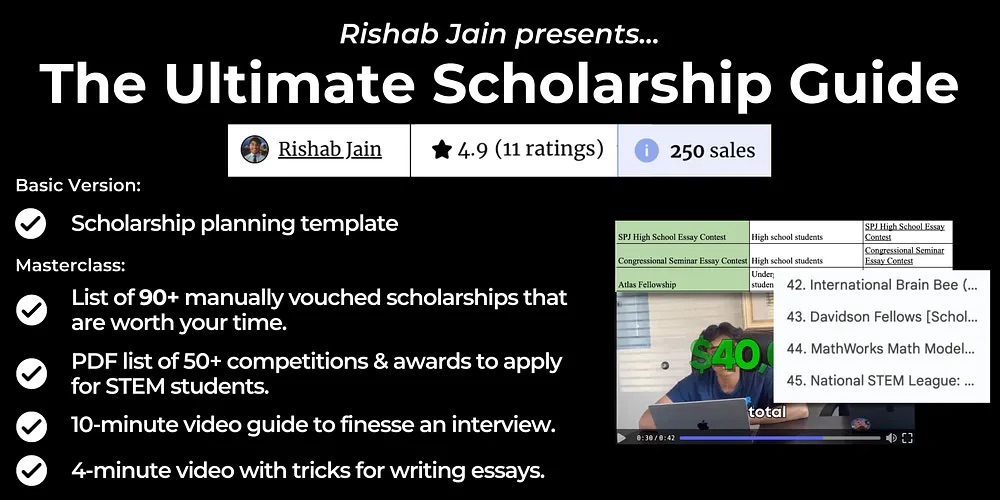
Free Scholarships Guide PDF: planning template & opportunities list
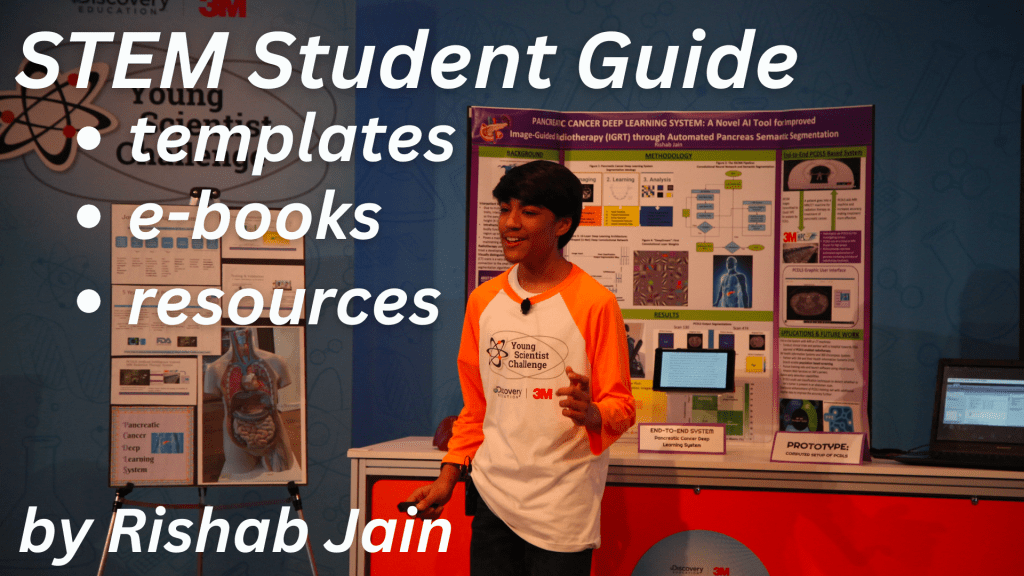
STEM Student Guide: 50+ STEM opportunities | Cold email templates + resume guide | Internships & scholarships lists
Recent posts

Ultimate Guide to Johns Hopkins High School Programs in 2024

Ultimate Guide to the John Locke Institute Essay Competition

The Ultimate Guide to the Summer Programs at Harvard for High School Students

The Ultimate Guide to Finding the Right Career For High School Students
Ultimate list of music competitions for high schoolers 2024.

How to Win Envirothon: Ultimate Guide
Connect on linkedin, view posts by category:.
- college admissions
- competitions
- opportunities
- science fair
- summer program
- Uncategorized
Join our Discord to meet like-minded students!
See what extracurriculars i did to get into harvard, stanford, and mit:, discover more from rishabacademy.com.
Subscribe now to keep reading and get access to the full archive.
Type your email…
Continue reading

199+ Authentic Chemistry Research Topics for High School Students
Discover exciting chemistry research topics for high school students. Dive into fascinating experiments and real-world applications, and ignite your passion for science!
Hey, high schoolers! Ever pondered over the microscopic workings that shape our world? Chemistry holds the key! Whether you’re curious about concocting potions or unraveling the mysteries of transformation, there’s a vast realm awaiting exploration.
So, gear up as we delve into some captivating chemistry research topics crafted specifically for you. Let’s embark on a journey to unveil the enigmas of the elements together!
Table of Contents
Benefits of Chemistry Research in High School
Here’s why high school chemistry research important:
Hands-On Learning
- Dive into experiments for real chemistry understanding.
- Solve problems like a pro.
Research Skills
- Learn the scientific method in action.
- Master lab techniques for future success.
Boost Independence
- Own your project, build confidence.
- Get creative with new ideas.
Prep for the Future
- Impress colleges with your skills.
- Try out STEM careers early.
Bonus Benefits
- Improve communication skills.
- Feel proud of your achievements.
In short, high school chemistry research isn’t just about books—it’s about real-world skills and a bright future in science!
Chemistry Research Topics for High School Students
Check out chemistry research topics for high school students:-
Organic Chemistry
- Synthesis of organic compounds
- Catalyst effects on organic reactions
- Natural product analysis
- Organic polymers and applications
- Enzyme structure and function
- Biodegradable plastics from renewables
- Chemistry of essential oils
- Food additives and preservatives
- Natural dye extraction
- Green synthesis methods
Inorganic Chemistry
- Synthesis of inorganic compounds
- Coordination compounds and uses
- Metal complexes in biology
- Transition metal properties
- Metal alloys and applications
- Heavy metal pollution impacts
- Nanomaterial synthesis
- Ceramic chemistry
- Zeolites in industry
- Inorganic pharmaceuticals
Physical Chemistry
- Chemical kinetics
- Thermodynamics of reactions
- Electrochemistry applications
- Gas laws and implications
- Quantum mechanics basics
- Spectroscopic analysis
- Computational chemistry
- Surface chemistry and adsorption
- Chemical equilibrium
- Photochemistry principles
Analytical Chemistry
- Drug detection methods
- Chromatography techniques
- Electroanalytical methods
- Spectroscopic food analysis
- Chemical sensors for pollutants
- Water quality analysis
- Forensic chemistry techniques
- Pharmaceutical quality control
- Chemical measurement methods
- Biomolecule analysis
Environmental Chemistry
- Air pollution sources
- Greenhouse gas impacts
- Wastewater treatment
- Soil pollution analysis
- Pesticide environmental fate
- Nutrient cycling in ecosystems
- Alternative energy chemistry
- Sustainable chemistry practices
- Recycling and waste management
- Ecotoxicology studies
Biochemistry and Molecular Biology
- Biomolecule structure-function
- Enzyme kinetics
- Metabolic pathway regulation
- Genetics of diseases
- Molecular biology techniques
- Bioinformatics basics
- Cell signaling pathways
- Chemical biology in drug discovery
- Gene expression regulation
- Neurotransmitter biochemistry
Nanotechnology
- Nanoparticle drug delivery
- Nanotechnology in electronics
- Nanomaterials for remediation
- Nanobiotechnology integration
- Nanotoxicology studies
- Nanomaterials for energy
- Self-assembly techniques
- Nanoscale imaging methods
- Nanomaterials in food packaging
Pharmaceutical Chemistry
- Drug design and development
- Drug metabolism studies
- Antibiotic chemistry
- Drug delivery systems
- Medicinal natural products
- Drug quality control methods
- Pharmaceutical formulation
- Personalized medicine approaches
- Poorly soluble drug enhancement
- Radiopharmaceutical synthesis
Materials Chemistry
- Advanced material synthesis
- Semiconductor applications
- Smart material properties
- Biomaterials for implants
- Conducting polymer uses
- Superconductor applications
- Sol-gel chemistry basics
- Hybrid material properties
- Thin film deposition techniques
- Sustainable material research
Food Chemistry
- Food composition analysis
- Food additive safety
- Food contaminant detection
- Food flavor chemistry
- Food preservation methods
- Food packaging materials
- Fermentation chemistry
- Functional food benefits
- Food colorant chemistry
- Food fraud detection methods
Chemistry Education
- Curriculum development
- Hands-on experiments
- Technology integration
- Inquiry-based learning
- Student assessment methods
- Diversity in chemistry education
- Demonstration importance
- Community engagement
- Simulation use
- Teacher professional development
History and Philosophy of Chemistry
- Chemical concepts evolution
- Contributions by minorities
- Ethical considerations
- Philosophy of chemical laws
- Ancient chemistry history
- Societal impacts of discoveries
- Instrumentation history
- Chemistry in art conservation
- Interdisciplinary connections
- Chemistry for global issues
Green Chemistry
- Sustainable principles
- Safer chemical design
- Renewable feedstocks
- Waste-minimization methods
- Biocatalysis applications
- Green solvent use
- Energy-efficient processes
- Environmental impact metrics
- Green product evaluation
- Policy for green practices
Atmospheric Chemistry
- Ozone depletion causes
- Urban air pollution sources
- Acid rain effects
- Smog formation mechanisms
- Aerosol climate impact
- Greenhouse gas roles
- Atmospheric radical reactions
- Indoor air pollutant sources
- Volatile organic compound chemistry
- Particulate matter chemistry
Bioinorganic Chemistry
- Metal ions in biology
- Metalloenzyme catalysis
- Cellular metal transport
- Metal-based drugs
- Photosynthesis chemistry
- Metalloprotein structures
- Metallopharmaceutical applications
- Metalloregulatory proteins
- Metallocluster properties
- Nitrogen fixation biochemistry
Supramolecular Chemistry
- Molecular recognition
- Self-assembly principles
- Molecular machine design
- Supramolecular polymer basics
- Selective receptor creation
- Coordination cage applications
- Hydrogen bonding in chemistry
- Supramolecular drug delivery
- Analyte sensing methods
- Reversible reaction applications
Petrochemistry
- Petroleum refining processes
- Crude oil characterization
- Petrochemical feedstocks
- Catalytic cracking basics
- Fuel chemistry overview
- Polymerization reactions
- Plastics production
- Oil spill impacts
- Natural gas processing
- Renewable energy prospects
Chemical Engineering
- Reactor design basics
- Separation process overview
- Process intensification methods
- Chemical plant safety
- Process control automation
- Bioprocess engineering principles
- Green engineering practices
- Computational fluid dynamics
- Process modeling techniques
- Energy efficiency methods
Forensic Chemistry
- Spectroscopic evidence analysis
- Trace evidence analysis
- Toxicology testing methods
- Forensic DNA analysis
- Insect evidence analysis
- Arson investigation chemistry
- Explosives chemistry
- Forensic anthropology basics
- Forensic odontology overview
- Forensic botany principles
Marine Chemistry
- Ocean acidification chemistry
- Marine pollution sources
- Marine wastewater treatment
- Marine natural product analysis
- Chemical ecology overview
- Oceanic trace metal chemistry
- Microplastics in oceans
- Marine sediment analysis
- Remote sensing for oceans
- Marine chemistry’s role in climate
This should make it easier for high school students to grasp and choose topics for their research projects.
What are hot topics in chemistry?
Chemistry is buzzing with new discoveries! Here are some hot topics:
- Using renewable resources.
- Better batteries and clean water.
Materials and Nanotech
- Special materials for everything.
- Tiny tech for medicine and electronics.
Medicine and Health
- Faster drug discovery.
- Personalized treatments and implants.
AI in Chemistry
- Smart machines for research.
- Designing new materials faster.
Climate Chemistry
- Trapping carbon emissions.
- Understanding climate impacts.
Exciting times ahead in the world of chemistry!
Tips for Choosing the Right Research Topic
Choosing the right research topic is crucial. Here’s how:
Follow Your Interests
- Pick something you’re curious about.
- Use your strengths.
Match Your Goals
- Make sure it fits your project requirements.
- Think about your future plans.
Check Feasibility
- Ensure there’s enough info available.
- Be realistic about time.
Seek Impact
- Find a fresh angle.
- Aim to contribute something new.
Refine Your Focus
- Start broad, then narrow down.
- Keep your question clear.
- Talk to others for ideas.
- Stay updated on research.
- Stay flexible as you go.
With these tips, you’ll find the perfect topic for your research!
Step-by-Step Guide to Conducting Chemistry Research
Diving into Chemistry Research: Your Easy Guide
Follow Your Curiosity
- Think about what interests you in chemistry.
- Read books or search online to learn more.
- Find out where there’s more to explore.
Plan Your Research
- Make your question clear and doable.
- Read up on what’s already known.
- Take a guess and plan how to test it.
Jump into Experiments
- Stay safe while experimenting.
- Stick to your plan and write everything down.
- Record your findings neatly.
Understand Your Results
- Look at what the numbers tell you.
- See if your results match your guess.
- Find any surprises or cool patterns.
Share What You’ve Found
- Write down what you discovered.
- Use pictures or graphs to show your results.
- Think about telling others or showing it at a conference.
- Talk to teachers or friends for help.
- Team up with others for more fun.
- Don’t give up, even if things get tricky.
Remember, exploring chemistry is all about having fun and discovering new things!
Challenges and Solutions in High School Chemistry Research
High School Chemistry Research: Overcoming Challenges
- Limited Resources: Few fancy tools in school labs.
- Time Crunch: Hard to balance with school and activities.
- Safety Concerns: Some experiments aren’t safe.
- Basic Knowledge: Need to understand core concepts well.
- Get Creative: Think outside the box.
- Manage Time: Plan around your busy schedule.
- Stay Safe: Stick to safe experiments.
- Study Up: Master the basics.
- Try Citizen Science: Simple projects for real-world research.
- Connect to Real Life: Link your research to what’s happening around you.
Enjoy the journey of high school research!
Which is the best topic for research in chemistry?
Finding the Right Chemistry Research Topic
- Your Interests: What part of chemistry fascinates you?
- Available Resources: What equipment and materials do you have access to?
- Current Trends: Which areas of chemistry are advancing quickly?
- Feasibility: Can you realistically complete the research with your time and resources?
- Latest Research: Check online and scientific journals.
- Chemistry Societies: Look into undergraduate research sections.
- Talk to Teachers: Get guidance based on your interests and resources.
Remember, the best topic is one that excites you and fits your abilities.
What are the hard topics in high school chemistry?
Mastering High School Chemistry Challenges:
- Atoms: Understand electron behavior.
- Bonding: Learn how atoms stick.
- Math: Get comfy with numbers.
- Equilibrium: Grasp reaction balance.
- Electricity: Explore chemical sparks.
Extra Hurdles
- Visualization: See tiny atoms clearly.
- Math Skills: Flex algebra muscles.
- Balancing: Keep reactions in check.
By tackling these points, high schoolers can conquer chemistry with ease.
What are the project topics under chemistry?
Chemistry projects cover key areas:
- Chemical Analysis: Identifying substances and their structures.
- Chemical Synthesis: Creating new materials or molecules.
- Chemical Properties: Understanding reactions and factors affecting them.
- Environmental Chemistry: Exploring chemical interactions in nature.
Here are some project ideas
- Analyze household products.
- Develop a water testing kit.
- Study food dye chemistry.
- Make biodegradable plastics.
- Grow salt crystals.
- Extract natural dyes.
- Investigate reaction rates.
- Explore pH indicators.
- Build a simple battery.
- Test pollutant adsorption.
- Study plastic biodegradation.
- Analyze water treatment methods.
What topics are related to chemistry?
Chemistry has different parts:
- Organic: Studies carbon compounds, like in living things.
- Inorganic: Looks at non-carbon stuff, such as metals.
- Analytical: Figures out what’s in mixtures.
- Physical: Uses physics for chemical stuff, like atoms.
- Biochemistry: Studies chemicals in living things.
- Environmental: Examines how chemicals affect nature.
- Materials: Makes new materials for tech and medicine.
- Medicinal: Makes drugs using chemistry.
These areas show how chemistry is everywhere!
Alright, let’s sum it up: Chemistry’s like a treasure trove of fun for high schoolers to explore. Whether they’re poking around with stuff from home or seeing how chemicals impact the world around us, there’s loads to discover.
These projects aren’t just about memorizing facts—they’re about getting hands-on and curious, which sets students up for future success. So, by diving into chemistry, high schoolers can have a blast while learning and who knows, maybe even stumble upon something really neat!
Related Posts

Top 300+ Qualitative Research Topics For High School Students

100+ Most Interesting Google Scholar Research Topics For Students [Updated 2024]
Leave a comment cancel reply.
Your email address will not be published. Required fields are marked *
Save my name, email, and website in this browser for the next time I comment.

50 Astonishing Chemistry Research Project Ideas for High School
Dive headfirst into the incredible universe of Chemistry with our mind-blowing “Chemistry Research Project Ideas for High School” – it’s like a cosmic dance party where atoms bust out moves, molecules throw down their best grooves, and reactions unfold like the coolest stories ever. Picture yourself as a high school rockstar gearing up for a scientific adventure that’s equal parts awe and wow!
Forget the ordinary mixing-in-beakers routine; we’re talking about unleashing your inner Sherlock Holmes on the molecular stage. These projects aren’t just about chemicals; they’re your VIP ticket to uncovering secrets, creating magical concoctions, and basically becoming the superhero of the microscopic world.
Whether you’re a lab coat enthusiast or just someone curious about the universe’s hidden wonders, consider this your golden opportunity to shake up the scientific scene. Get ready to stir up some excitement, trigger a reaction, and uncover the sheer awesomeness that is high school Chemistry research. Let the experiments steal the spotlight – the stage is yours!
Table of Contents
Benefits of High School Chemistry Research Projects
Check out the benefits of high school chemistry research projects:-
- Channel Your Inner Scientist: High school chemistry projects are your backstage pass to becoming a real-life scientist. Imagine concocting mixtures, seeing reactions, and feeling that “Aha!” moment – it’s science like you’ve never seen it before!
- Exercise Your Brainpower: Say goodbye to dull memorization! These projects are a full-on brain workout. You’ll be tackling puzzles, deciphering reactions, and flexing those brain muscles like a chemistry ninja.
- Chemistry Comes Alive: No more snooze-worthy textbooks! With research projects, chemistry leaps off the page and into your hands. Suddenly, molecules and reactions become your new playmates.
- Play the Role of a Science Sleuth: Ever fancied being a detective? Well, grab your lab coat because now you get to formulate hypotheses, design experiments, and uncover the secrets of your chosen chemistry enigma.
- Dip Your Toes into a Chemistry Career: Curious if chemistry is your calling? These projects are like a sneak peek behind the scenes of a chemist’s life. It’s a bit like test-driving your future career!
- Speak Science Like a Pro: Prepare to dazzle everyone with your science jargon. Whether you’re penning a report or rocking a presentation, you’ll be chatting about your project like a seasoned science rockstar.
- Solo Science Expedition: Ever dreamt of being the lone genius on a mission? Research projects let you be just that. From planning to experimenting, it’s your project, your rules.
- Ready for College Challenges: Gear up for college like a pro. These projects are your training ground, especially if you’re eyeing a future in the science world.
- Embrace Tech Wizardry: Become a tech magician in the lab. Many projects involve cool gadgets and software, turning you into a chemistry sorcerer with a digital flair.
- Teamwork Tango: It’s not always a solo act. Some projects involve a teamwork tango. Learn to groove with your peers, share ideas, and create chemistry magic together.
- Crack Chemistry Riddles: Fancy yourself a riddle master? Research projects throw challenges your way, and you get to be the superhero cracking the chemistry code.
- Lab Adventures Await: Transform into a lab adventurer! Your experiments aren’t just about mixing stuff; they’re about mastering lab skills, staying safe, and feeling like a chemistry explorer.
- Future STEM Star: Dreaming of a future in science? Chemistry projects are your guiding stars. They map out the exciting world of science, tech, engineering, and math.
- Real-World Science Thrills: Forget theory; it’s a real-world rollercoaster. Research projects bridge what you learn in class to the electrifying reality of chemistry in action.
- Boost Your Confidence: It’s not just about the project; it’s about you. These projects boost your confidence, spark your curiosity, and set you on a path of personal growth. Get ready to shine!
Chemistry Research Project Ideas for High School
Check out chemistry research project ideas for high school:-
Organic Chemistry
- Natural Dye DIY: Colors from Veggies Turn kitchen scraps into vibrant dyes. It’s like a mini science experiment, and you get cool colors for fabrics!
- Eco-Friendly Plastics: Cooking Up Solutions Make plastics that won’t stick around forever. All you need are kitchen items and a dash of curiosity.
- Soap-making Adventure: Suds and Scents Create your soap with ingredients from the pantry. It’s like a bubbly kitchen science party!
- Biodiesel Fun: Fuel from the Frying Pan Can cooking oil power your car? Find out with this green experiment.
- Perfume Playtime: Your Scent, Your Rules Mix oils for your own perfume. It’s like becoming a fragrance artist at home.
- Lip Balm Bliss: Crafting Soft Lips Cook up your lip balm recipe. It’s a tasty way to soothe your lips.
- Glue Galore: Homemade Stickiness Test different homemade glues. Which one will be your sticky superhero?
- Fruity Freshness: Keeping Fruit Happy Save fruits from going mushy. It’s like being a superhero for your snacks.
- Eco-Packaging Quest: Say No to Plastic Design your eco-friendly packaging. Who knew starch could be so cool?
- Antioxidant Adventure: Food for Thought Explore antioxidants in foods. It’s like a tasty journey into healthy eating.
Inorganic Chemistry
- Crystal Magic: Grow a Crystal Garden Transform your room into a crystal wonderland. It’s like creating your own sparkly universe!
- Chemical Color Show: Flames and Fun Watch flames turn into colorful dancers. It’s like having a tiny fireworks display at home.
- Catalytic Rockets: Chemistry Fireworks Mix up hydrogen peroxide and catalysts for a fizzy show. Chemistry meets fireworks!
- Glowing Reactions: Light Up Your Lab Create glow-in-the-dark reactions. It’s like magic, but with household items.
- Electroplating DIY: Shiny Creations Turn everyday items into metallic masterpieces. It’s like giving your stuff a fancy makeover.
- pH Fun: Colorful Potions Make your color-changing potions. It’s like being a wizard in the kitchen.
- Hydrothermal Magic: Cook Up Metal Oxides Experiment with hydrothermal synthesis. It’s like turning your kitchen into a metal-making lab.
- Viscosity Voyage: Liquids on the Move Become a liquid expert. See how liquids flow at different temperatures.
- Gas Law Party: Balloons and Science Play with balloons to understand gases. It’s like having a balloon-filled science party.
- Nano-Adventure: Tiny Wonders Shrink down to the world of nanoparticles. It’s like exploring a tiny, invisible universe.
Physical Chemistry
- Vapor Wonder: Secrets of Evaporation Learn how liquids evaporate. It’s like discovering the hidden dance of molecules.
- Kinetics Fun: Timing Chemical Dances Time chemical reactions like a pro. It’s like being a choreographer for molecules.
- Heat Explorer: Burning Questions Measure the heat of burning alcohols. It’s like turning your kitchen into a heat lab.
- Calorimetry Carnival: Measuring Magic Heat Explore how heat flows in reactions. It’s like being a magician with calorimetry.
- Phase Change Fiesta: Liquid to Solid Adventure Create a map of how things change state. It’s like drawing your own adventure map.
- Conductive Circus: Electricity Playtime Test how well things conduct electricity. It’s like being an electricity circus director.
- Thermodynamics Trek: Journey into Chaos Explore chaos and order with thermodynamics. It’s like traveling through a world of heat and energy.
- Quantum Quest: Light and Electrons Dive into quantum physics. It’s like being a scientist in a world of tiny particles.
- Supercooling Safari: Chilling Water Magic Explore supercooling. It’s like having a freezing safari adventure.
- Density Dazzle: Mass and Volume Secrets Dive into the world of density. It’s like uncovering the relationship between mass and volume.
Analytical Chemistry
- Chromatography Magic: Colors Unleashed Make vibrant chromatograms. It’s like painting with science!
- Magnetic Cereal Adventure: Detecting Iron Be a cereal detective with magnets. It’s like finding hidden iron treasures.
- pH Meter DIY: Testing Acidity Create your pH magic wand. Test acidity like a scientist.
- Metal Detectives: Finding Ions Become a metal detective. Find ions in different solutions.
- Ion Selective Electrode Fun: Dive into ion analysis. It’s like having a secret agent tool for measuring ions.
- Forensic Spectra Sleuth: Solve the Mystery Be a forensic expert with spectroscopy. It’s like solving a colorful mystery.
- Electroanalytical Adventure: Explore Electricity Dive into electroanalysis. Test the electrical properties of solutions.
- Mass Spectrometry Magic: Identify Compounds Enter the world of mass spectrometry. It’s like having a chemical detective tool.
- Environmental Detective: Air Quality Check Be an environmental detective. Test air quality at home.
- DNA Sleuth: Genetic Investigation Investigate DNA with PCR and gel electrophoresis. It’s like being a DNA detective.
Biochemistry
- Enzyme Fun: The Magic of Catalysts Discover enzyme magic. It’s like having tiny helpers in your kitchen.
- Photosynthesis Party: Plant Celebration Join the plant party. Explore how light affects photosynthesis.
- Cellular Respiration Adventure: Dive into cellular respiration. It’s like understanding how cells breathe.
- Antibiotic Battle: Fighting Bacteria Be a bacteria warrior. Explore antibiotic resistance.
- Gel Electrophoresis Gala: DNA Dance Dance with DNA using gel electrophoresis. It’s like having a genetic disco at home.
- Biodegradation Bonanza: Earth’s Cleanup Crew Be part of nature’s cleanup crew. Test microbes’ ability to degrade pollutants.
- Metabolic Maze: Navigating Pathways Navigate the metabolic maze. Explore cellular metabolism pathways.
- Cell Signaling Symphony: Communication in Cells Conduct the cellular orchestra. Explore cell signaling pathways.
- Protein Folding Fiesta: Unraveling Mysteries Unfold protein mysteries. Explore factors affecting protein folding.
- Genetic Engineering Extravaganza: Modify with Care Enter the world of genetic engineering. Explore applications and ethical considerations.
How do you choose a research topic in chemistry?
Embarking on a high school chemistry research project? Fantastic! But how do you pick that magic topic that lights up your scientific soul? Fear not, fellow researcher—here are some snazzy criteria to guide you:
Unleash Your Inner Scientist: Follow Your Passion
- Dive into Your Interests: Think about what gets you buzzing with excitement. Whether it’s concocting potions or unraveling the secrets of molecules, choose a topic that makes you say, “This is cool!”
- Future Goals Alignment: Consider how your chosen topic aligns with your dreams. Picking a project connected to your future goals adds a dash of purpose to your scientific journey.
Navigating the Science Playground: Practical Considerations
- Lab Resources Check: Before diving into the experiment abyss, make sure your school’s lab has the gadgets and gizmos you need. A well-equipped lab can turn your project into a scientific playground.
- Mentor Magic: Having a mentor is like having a wizard guide. Check if you have a wise mentor to sprinkle some knowledge and guidance on your magical potion-making journey.
Riding the Scientific Wave: Current Trends
- Stay Hip with Trends: Be the cool scientist on the block by keeping up with the latest trends. Choosing a trendy topic ensures your project isn’t just a science project—it’s a scientific happening!
- Real-World Impact: Picture this: your project making waves in the real world. Aim for a topic with the potential to change the game or solve a real-world puzzle. Science, meet impact!
So, there you have it—a guide to picking the chemistry project of your dreams. Let your curiosity run wild, mix in a bit of practicality, and soon you’ll be on a scientific adventure like no other!
And there you have it, the grand finale of “High School Chemistry Projects” – your backstage pass to a world where beakers become magic potions, and curiosity is the ultimate superpower!
Imagine yourself not just as a student but as a scientific explorer, diving into the epic adventure of chemical mysteries. Forget the snooze-fest – we’re talking about real-life magic tricks with reactions, unraveling the secrets of materials, and maybe even becoming an eco-friendly superhero with green chemistry.
These projects? They’re not just tasks; they’re your golden ticket to a scientific rollercoaster. Ever wanted to be a chemistry wizard mixing up crazy concoctions? Now’s your chance!
But wait, it’s not just about geeking out over elements – it’s about the whole journey. Expect a few bumps in the road; experiments don’t always go as planned, and that’s the secret sauce to becoming a chemistry rockstar.
Beyond the cool experiments, these projects are your secret training ground for life. Team up with your pals, communicate your findings like a science storyteller, and learn that failing forward is the real winning move.
So, to all the budding chemists out there, throw on your imaginary lab coat (or a real one if you’re feeling fancy), stir up that curiosity, and let’s kick off the high school chemistry party! May your experiments be as wild as your dreams, and may you exit not just with answers but with a lifelong crush on the mind-blowing world of chemistry!
Frequently Asked Questions
How can i present my research findings effectively.
Present your findings effectively by creating a well-structured research paper and a captivating presentation. Use visuals, practice your delivery, and participate in science fairs or competitions to showcase your work to a broader audience.
Is it possible to collaborate with professionals in the field?
Yes, collaborating with professionals enhances the quality of your research. Attend conferences, workshops, or reach out through networking platforms to connect with experienced researchers who can provide guidance and support.
Leave a Comment Cancel Reply
Your email address will not be published. Required fields are marked *
Save my name, email, and website in this browser for the next time I comment.

Introducing PolyPilot:
Our AI-Powered Mentorship Program
Start your trial today
Chemistry Research for High School Students
Chemistry is the scientific study of matter, its properties, composition, structure, and the changes it undergoes during chemical reactions. It allows us to understand and manipulate the building blocks of everything around us and has led to advancements in medicine and pharmaceuticals to innovations in materials science and environmental solutions. By studying it, we can address global challenges such as climate change, pollution, and disease.

Chemistry Research Guide
Chemistry Articles
Chemistry Projects
Chemistry Mentors
Chemistry Scholars
Types of Chemistry Research and Careers
Chemistry is a diverse field with various branches that focus on different aspects of matter and its interactions. Here's a quick overview of some major types of chemistry study:
Organic Chemistry focuses on carbon-based compounds, including hydrocarbons and their derivatives. It is essential for drug discovery and the synthesis of materials such as dyes and fuels.
Inorganic Chemistry focuses on inorganic compounds such as minerals, metals, and catalysts, which often exclude carbon. It is used to create fertilizers, paints, cosmetics, and batteries.
Physical Chemistry delves into the fundamental principles governing chemical reactions, with applications in developing new energy sources and understanding molecular interactions. It is used to study thermodynamics and quantum mechanics.
Analytical Chemistry are techniques used for analyzing the composition of substances. Examples include chromatography, and spectroscopy.
Biochemistry focuses on the chemical processes within and related to living organisms.
It contributes to advancements in medicine, genetics, and biotechnology, and ttopics for this sort of research include enzymes, metabolism, and molecular biology.
Environmental Chemistry seeks environmentally sustainable practices, promoting cleaner production methods and reducing the environmental impact of chemical processes. Research here might be done on pollution, climate change, and sustainability.
Theoretical Chemistry is the practice of developing and applying theoretical models to understand chemical phenomena more generally. This might include computational chemistry, quantum chemistry.
Nuclear Chemistry is the specific study of nuclear processes and properties of radionuclides. Relevant topics include radioactive decay and nuclear energy.
These branches often overlap, and interdisciplinary research is common in modern chemistry. If you want a career involving chemistry research, you might become a pharmaceutical researcher, an environmental scientist, a materials engineer, a flavor chemist (creating the tastes and scents in foods), or a forensic chemist who analyzes crime scene evidence to support investigations. Research can take place in laboratories, industrial settings, universities, or even in the field, investigating the chemical makeup of natural environments. Chemistry research, in its diverse forms, fuels innovation and addresses critical global issues, making it an exciting and impactful field for those interested in understanding and shaping the world at the molecular level.
How to Get into Chemistry
Start by talking to your chemistry teacher or any science teacher you admire. They can guide you on relevant courses, extracurriculars, and even suggest fun experiments you can try at home. Participate in science clubs or join a local STEM organization where you can meet like-minded peers and mentors. Attend science fairs or workshops to get hands-on experience and discover specific areas of chemistry that pique your interest. Consider volunteering at science-related events or intern at a local lab if possible—it's a fantastic way to gain practical experience. Read about the latest breakthroughs in scientific journals or magazines, and maybe even start a science blog to share your discoveries. And remember, chemistry can be quite complex. It's okay not to have everything figured out right away—exploring and enjoying the learning process is a big part of the journey. Here are some high school classes, books, and extracurriculars to get you going on your chemistry journey.
1. Take a Class in High School
Obviously you would want to take as many chemistry classes as your high school offers. Given the chance, opt for honors, advanced, or AP courses that give you a more in-depth exploration of chemistry topics, often covering additional subjects such as thermodynamics, kinetics, and equilibrium. The availability of advanced courses such as Organic Chemistry, Biochemistry, and Forensic Chemistry can vary between schools. If you're passionate, consider talking to your school's guidance counselor or science department about pursuing an independent study or an additional class at a local community college. (If you want to progress to more advanced levels on your own, you can also pursue virtual classes on MIT OpenCourseWare, Coursera, MITx, and Khan Academy.)
Other relevant coursework:
Calculus is fundamental for understanding the mathematical concepts behind chemical reactions, rates, and thermodynamics. It's particularly important if you're considering a career in theoretical chemistry or research.
Computer Science is helpful because computational chemistry is a growing field. Learning programming languages and computational techniques can be advantageous, especially if you're interested in simulations and data analysis.
Environmental Science provides insights into how chemistry interacts with the environment, important if you want to help address pollution and sustainability issues.
Statistics is crucial for designing experiments and analyzing data. Whether you're in a lab setting or involved in research, understanding statistical methods enhances your ability to draw meaningful conclusions from experiments.
Public Speaking can help you convey complex ideas clearly, which is vital in research, teaching, or any role where you need to articulate scientific findings.
Art or Graphic Design skills are increasingly important in scientific communication. Whether creating visuals for presentations or designing figures for publications, a background in art or graphic design can make your work more accessible and engaging.
Ethics or Philosophy are crucial in helping you understanding ethical considerations, especially if you're involved in research with potential societal impacts.
Business classes provide insights into project management, budgeting, and the practical aspects of running a lab or a company.
These classes offer a well-rounded education, preparing you not only with a strong foundation in chemistry but also with additional skills that can set you apart and open up diverse career paths within the field.
2. Read a Book
From deciphering the periodic table to delving into genetic wonders, these books offer an intellectually challenging yet (mostly) accessible plunge into the captivating world of atoms and elements. While some of the larger tomes might seem formidable, take it slow and team up with online resources and discussion for help. You can also complement your reading with documentaries and podcasts, letting the authors' enthusiasm guide your own research.
Foundational Classics:
The Feynman Lectures on Physics by Richard P. Feynman, Robert B. Leighton, and Matthew Sands (1963) - While primarily focused on physics, Feynman covers fundamental concepts in chemistry, making complex topics accessible to a wide audience. Feynman was also legendary for his (often humorous) live lectures, which you can find on YouTube.
The Double Helix: A Personal Account of the Discovery of the Structure of DNA by James D. Watson (1968) - This work gives you a glimpse into the world of molecular biology and the relationship between chemistry and biology.
The Periodic Table by Primo Levi (1975) - Levi, a chemist and Holocaust survivor, weaves autobiographical stories around elements from the periodic table, offering a unique and personal perspective on chemistry.
More Recent Works:
The Disappearing Spoon: And Other True Tales of Madness, Love, and the History of the World from the Periodic Table of the Elements by Sam Kean (2010) - Kean explores the fascinating stories behind each element, making the periodic table come alive and demonstrating the human side of chemistry.
Stuff Matters: Exploring the Marvelous Materials That Shape Our Man-Made World by Mark Miodownik (2013) - Miodownik delves into the chemistry of everyday materials, from concrete to chocolate, making the subject accessible and highlighting its impact on our daily lives.
The Gene: An Intimate History by Siddhartha Mukherjee (2016) - While more focused on genetics, this book provides a comprehensive exploration of the science behind the gene, touching on the intersection of chemistry and biology.
To supplement your reading and stay updated on the latest developments in the field, you should consider following reputable chemistry journals and news outlets, such as Nature , Science , and Journal of the American Chemical Society . Additionally, magazines like Chemical & Engineering News provide accessible updates.
You can also follow online platforms like Chemistry World, ACS Reactions on YouTube, and TED-Ed for engaging videos, articles, and discussions on current developments in chemistry. Chemistry-related podcasts such as "The Infinite Monkey Cage" and "Chemistry in its Element" are fun ways to give more context to what you may be learning at school.
3. Extracurricular Study
Spending time outside of school getting hands-on chemistry experience can greatly enhance your skills. And these extracurricular activities are not just about building your resume but also about genuinely exploring your interests and passions and meeting like-minded peers. Here are some options:
Chemistry Olympiad - Participate in local or national Chemistry Olympiads. These competitions involve challenging problem-solving and lab work, honing your analytical and practical skills. Success can also open doors to prestigious programs and scholarships.
STEM Club and Outreach - Volunteer in STEM outreach programs for younger students or your community. Design and lead interactive chemistry demonstrations, fostering your teaching and presentation skills while sparking an interest in science among others.
Chemistry Podcast - As a related exercise, or on its own, you can start a STEM podcast with a focus on chemistry. Research and discuss interesting topics, interview professionals, and enhance your science communication skills. This initiative not only broadens your knowledge but also hones your ability to articulate complex concepts.
Molecular Gastronomy or Cooking Club - Start a molecular gastronomy or just a simple cooking club. Explore the science behind food, experimenting with techniques like spherification and foaming. This interdisciplinary approach combines chemistry with culinary arts, expanding your scientific creativity.
Volunteer Lab Assistant - Reach out to local universities or hospitals to see if you can shadow lab workers. Assisting with even the simplest of lab tasks can give you valuable exposure to systems and techniques.
Chemistry Research Opportunities
We acknowledge that finding chemistry research opportunities in labs can be challenging for high school students. You may lack the specialized knowledge and skills typically expected in research environments. Limited resources and funding as well as safety protocols within universities can make it difficult to train high schoolers. Moreover, the competitive nature of research positions, even at basic level, means that opportunities may be snatched up first by college undergrads. However, despite these challenges, persistence, proactive outreach, and leveraging online resources can help you secure valuable research experiences.
Start by reaching out to your school's science department or local universities and just see what’s available. Your best chances are at summer research programs, both online and in-person, specifically designed for high schoolers. Let’s explore some options and tactics in more detail.
Find research programs close to home
To find chemistry research opportunities close to home, check out our High School Student Research Opportunities Database . Click on your state, then search based on your location, institution, event type (in-person or virtual), and tuition (paid or free).
Work with a professor
If you have a clear project idea, you can reach out to professors in your field to see if they are open to collaborating with you. Refer to our Guide to Cold-Emailing Professors (written by Polygence literature research mentor Daniel Hazard , a Ph.D. candidate at Princeton University).
Engage in your own research project
While you may face limitations in terms of access to advanced equipment and resources, you can design projects using commonly available materials and basic lab equipment. Make use of online resources, books, and your school's laboratory facilities. Carly Taylor , a Stanford University senior who has completed several research projects this way, outlined a guide about how to write a self-guided research paper . By reading it, you’ll get a better understanding of what to expect when taking on this type of project.
Independent projects may require extra effort, but they offer valuable learning experiences, demonstrating initiative and passion to colleges or future employers.With determination and creativity, high school students like you can even make meaningful contributions to the field of chemistry through independent research. If you would like a little guidance and support with your independent project, you can also choose to work with one of our Polygence chemistry mentors .
Enter a competition
The requirements and deadlines that competitions require you to meet provide a very helpful structure to keep your research moving forward. For some ideas, check out our post Top 10 Science Fairs and Competitions for High School Students . Another benefit to attending a competition is that you will meet other students, teachers, and even experts in the field you love most.
Summer Programs in Chemistry
Here are some top picks for summer chemistry research programs. We chose them based on a combination of their affordability, name recognition, social opportunities, and academic rigor.
1. Summer Science Program (SSP)
Hosting institution: Various
Cost: $8,400 (but most qualify for discounts)
Format: In-person (Host campuses include New Mexico Tech, University of Colorado, Purdue University, Indiana University, Harvey Mudd College, Caltech, and MIT)
Application deadline: Early March
This 5-week “educational experience of a lifetime” is open to high school juniors. Running since 1959, SSP immerses its 12 research teams (of 3 participants each) in a difficult research project. Past programs have included astrophysics, biochemistry, and genomics. You will also attend guest lectures, go on various field trips, and meet other brilliant kids from all over the world. The program fee is scaled to what each family can afford.
2. Research in Science & Engineering (RISE)
Hosting institution: Boston University
Cost: $5,620-$8,908
Format: In-person (Boston, MA)
Application deadline: Early February
RISE is a 6-week, 40-hour-a-week program for rising high school seniors who want to major in STEM and work in the field. Astronomy, Chemistry, Computer Science, and Neurology are just a few of the research track options. You will work on research projects with Boston University professors, postdoctoral fellows, or graduate students as advisors. They also participate in weekly peer-to-peer training. The event culminates in a poster discussion, where participants present their work.
3. Project SEED Summer Program
Hosting Institution: American Chemical Society (ACS)
Cost: Typically free
Application Deadline: Late April, varies by location
Project SEED is a unique initiative that gives economically disadvantaged hands-on research experiences in chemistry. The program aims to foster a passion for scientific exploration and support underrepresented students in pursuing STEM careers. Participants collaborate with mentors on research projects, gaining practical laboratory skills. Project SEED typically covers program expenses, making it accessible to a broader range of students. Application deadlines may vary, so check with your local ACS chapter for specific details on how to apply.
4. Research Science Institute (RSI)
Hosting institution: Center for Excellence in Education (CEE)
Application deadline: Early January
Note that RSI is highly selective and only admits about 80 high school students each year from a pool of thousands of applicants. Check out “How to Get Into Research Science Institute (RSI)” , our entire post dedicated to tactics for increasing your chances of being accepted. The program is hosted at the Massachusetts Institute of Technology (MIT). Students are selected based on their academic achievements, research potential, and personal qualities such as creativity, leadership, and motivation. RSI is free, with all expenses paid (including travel, room and board, and research supplies). Also be sure to check the site for the most current application information.
5. Simons Summer Research Program
Hosting institution: Stony Brook University
Cost: Paid fellowship
Format: In-person (Stony Brook, NY)
Also known as the Simon Fellowship, this prestigious and highly selective 8-week program matches about 30 students each year with a Stony Brook faculty mentor in various fields, including chemistry. Students are selected based on their academic achievements, research potential, and personal qualities such as creativity, curiosity, and dedication. This program gives you a great opportunity to join research groups, produce a research abstract, work with a supportive community of peers and mentors, plus receive a stipend award. Check the site for the most current application information.
For a full list of our recommended summer program read T op Chemistry Summer Programs for High School Students
Chemistry Internships for High School Students
Ensuring the safety of high school students and providing the necessary supervision can be challenging for research institutions and laboratories, which is part of the reason why chemistry internships can be difficult to come by. Competition from college-level students with more skills and experience in the lab is another reason. Some opportunities do exist, however, and it’s always worth checking out colleges in your area to see if they offer opportunities for qualified high school students.
1. NASA Internships for High School Students
Hosting institution: NASA
Location: Varies
Deadline: Varies
Compensation: Varies
NASA provides internship opportunities for high school students interested in various STEM fields, including chemistry. Interns work on projects related to space exploration, earth science, and technology.
2. Broad Summer Scholars Program (BSSP)
Hosting institution: Broad Institute of MIT and Harvard
Location: Cambridge, MA
Deadline: Late January
Compensation: $3,600 stipend
The Broad Summer Scholars Program offers high school students the chance to engage in genomics and biomedical research. While not exclusively focused on chemistry, the program covers interdisciplinary aspects of scientific research.
3. Anson L. Clark Scholars Program
Hosting institution: Texas Tech University
Location: Lubbock, TX
Deadline: Mid-February
Compensation: $750 stipend
This paid 7-week internship offers exceptional students interested in chemistry the opportunity to work with outstanding professors at the University's General Health Sciences Center. Although the program is research-based, it also includes weekly hands-on seminars, discussions, and field trips. We’re very impressed by this program’s academic rigor and its on-campus experience with zero cost to the student. The only catch is that only twelve students are selected every year.
Looking for more internships? Read our post on Top Chemistry Internships for High School Students
Chemistry Project Ideas and How to Brainstorm Your Own
Start by exploring topics that really matter to you. Maybe it's related to sports and the chemical composition of popular sports drinks or the impact of household products on the ecosystem or the chemistry of fragrances. Consider real-world problems and applications. Talk to your teachers, read scientific journals, and attend local science events to discover emerging trends and keep a list of ideas.
Polygence Scholars Are Also Passionate About
Here are some ideas that show you how you can blend real-life passions with chemistry to develop a deeper understanding of its applications.
What's in my water?
Most water contains heavy metal ions such as copper, iron, and zinc. Not all metal ions are bad but at high concentrations they can be unsafe. In this project you could collect water samples within your community and measure the metal ion levels such as ferric and ferrous water. Research techniques for how to accurately measure metal ion levels in water. In this project, you’ll learn more analytical chemistry techniques and explore a question relevant to public health.
Idea by chemistry research mentor Grace
Battery storage
Batteries are proving to be a great way to store large amounts of energy from intermittent renewable sources. This project could involve researching current battery technologies and showing through graphs or some other visual representation of how much battery storage a city (or state/province) would need to run 100% off of renewable sources.
Idea by chemistry research mentor Landon
Metals for life
If asked about metals important to life, chances are iron and calcium would first come to mind, as they are important parts of our blood and bones. There are many more metals that are needed for essential biological functions, however. In this project you will dive into scientific literature to learn about different life metals, find out what their roles are in biology, and learn what kind of life forms need them. You will also learn about the newest addition to the life metals - the lanthanides. Then, choose one life metal and review two recent scientific articles involving your metal of choice. Finally, generate a description of the metal's function in biology. Your creativity is the limit as to how you show the importance of metals for life.
Idea by chemistry research mentor Nathan
When brainstorming research ideas, it's also important to consider the real-world relevance of your chosen topic. Think about how your research can address practical issues or applications. This could lead you into areas such as renewable energy, climate change, medicine, or materials science, where the impact on the real world is evident.
For more inspiration read 12 Chemistry Project Ideas for High School Students
Chemistry Projects from Polygence Scholars
Here are some inspiring chemistry projects done by some of our Polygence Scholars.
Inclusion of Photolyase in Sunscreen and its Effects
Interested in preventing skin cancer, Natasha hypothesized that incorporating enzymes from organisms, specifically photolyase and T4 endonuclease V, known for repairing cyclobutane pyrimidine dimers (CPDs), could be an effective strategy to reduce UV-induced DNA damage in humans. To test this hypothesis, her study reviewed existing research on the efficacy of these enzymes in repairing CPDs in humans, finding promising results. Check out her full research paper .
N-Carbon Quantum Dots for Chromosome Imaging
Fascinated by genetic research, Betül wanted to make nitrogen-doped carbon quantum dots (N-CQDs) using a cost-effective, bio-sourced method from radish, enhancing their fluorescence and DNA-binding properties. Chromosome imaging confirmed N-CQDs' ability to bind to chromosomes, outperforming DAPI under the FITC filter. Her findings suggest N-CQDs' potential advantages in genetic research applications, offering an economical and efficient alternative to traditional methods. Read the research paper .
African Herbal Remedies: The Healing Abilities of Nature's Gift
Nicolette explored the healing properties of traditional African herbal remedies, focusing on their application in curing Typhoid, Malaria, and COVID-19. Acknowledging the ancient roots of herbal medicine in Africa, the study aimed to understand its evolution and the reasons behind its decline. Her research highlighted their cultural acceptance, compatibility with the human body, and minimal side effects. She also addressed the challenges leading to the declining use of this medicinal practice. Read the research on her website.
Check out all the chemistry research projects done by Polygence Scholars.
Writing a Chemistry Research Paper
Once you have chosen a compelling and focused research question that you’re excited to research, start by clearly defining the purpose of your study. Try to establish a hypothesis or objective.
Next gather your research materials and start to conduct a thorough literature review to understand all of the existing research on the topic. As you gather information, you can begin outlining your research paper . The format of a chemistry research paper typically includes:
Abstract - A concise overview of the paper's objectives, methods, results, and conclusions.
Introduction - Clearly state the research question, hypothesis or thesis , and the significance of the study.
Methodology - Outline of the experimental approach, including the procedures and equipment used in the experiments.
Results - Include tables, charts, graphs, and equations to present data. Analyze and interpret the data, discussing any patterns, trends, or deviations.
Discussion - Interpret the results, relate them to the research question, and consider their broader implications.
Conclusion - Summarize the key findings and their significance.
References - Cite all sources, including previous research and relevant literature. Citations follow a specific style (e.g., APA, MLA).
Outstanding papers showcase critical thinking, creativity, and a thorough understanding of the scientific method. Discuss any unexpected outcomes or challenges faced during the research process, demonstrating adaptability and problem-solving skills. Ensure your conclusions align with your findings and tie back to your initial research question. Additionally, consider the broader implications of your research within the field of chemistry or its real-world applications. If applicable, propose future research directions.
Finally, edit your paper for clarity, coherence, and proper formatting. Seek feedback from teachers, peers, or mentors to refine your work. A well-organized, insightful, and meticulously researched paper, coupled with your passion for the subject, will undoubtedly make your chemistry research paper outstanding. If you get stuck, remember: It's not just about the results but the journey of exploration and discovery you convey through your writing.
If you need more general guidance overall, here’s a great article on how to write a good research paper . Also, if you have some ideas and want the support of a skilled expert, you can work with a Polygence chemistry mentor .
Journals in Chemistry
Once you’ve researched, written, and perfected your research paper, it’s time to introduce it to the world. You could enter it at a science fair or publish it in a journal. Publishing your research in a peer-reviewed journal can take the great work you’ve already done and add credibility to it. It also makes a stronger impression than unpublished research. The process of having your work reviewed by advanced degree researchers can be a valuable experience in itself. You can receive feedback from experts and learn how to improve upon the work you’ve already done.
Here are some publications you could look into.
1. The Journal of Emerging Investigators (JEI)
JEI is an online, peer-reviewed journal that publishes research by middle and high school students in various scientific disciplines, including chemistry. Please note that JEI requires that a teacher, mentor, or Principal Investigator of a lab submit your research on your behalf.
Deadline: Rolling
Type of research: Original research in the biological and physical sciences written by middle and high school students.
2. Journal of High School Science (JHSS)
The Journal of High School Science is a peer-reviewed quarterly publication showcasing high school student research in the realm of science (including chemistry, technology, engineering, arts, and mathematics.
Type of research: STEAM-based research or innovations by high school students.
Regarding getting your project accepted and published at these or any other peer-reviewed journal: Be prepared for the possibility of rejection or revisions. Scientific publishing is a competitive process, so maintain a positive attitude and be persistent in your efforts to improve and disseminate your research. (Quote from The Journal of High School Science website)
3. The Young Scientists Journal (YSJ)
YSJ is a student-run journal that publishes research from students worldwide across various scientific disciplines, including chemistry.
Type of Research: YSJ accepts original research articles, reviews, and essays, providing a platform for high school students to share their scientific contributions.
4. Research Archive of Rising Scholars
You can also showcase your work in The Research Archive of Rising Scholars (RARS) , an open-access preprint archive for research articles written by young scholars, like you, from around the globe. Having your work circulated through RARS means that you’ll have a link to share with others so that they can read and engage with the research you’ve completed. Since this is a non-peer-reviewed preprint server, students who showcase their work on RARS can decide at any point to submit their work to a journal or competitions for consideration.
Looking for other ways to showcase your research? Be sure to read our list of Chemistry Competitions for High School Students article
From the Polygence Knowledge Hub
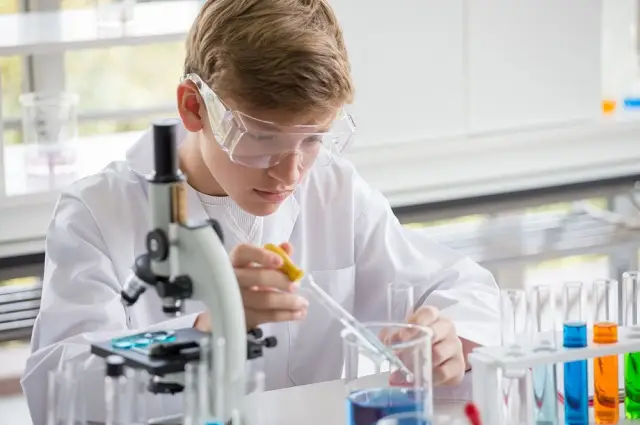
RESEARCH OPPORTUNITIES
2 minute read
Chemistry Summer Programs & Research Opportunities for High School Students
Apr 15, 2024

3 minute read
Apr 13, 2024

1 minute read
10 Fun and Educational Chemistry Experiments for Kids
Mar 6, 2024
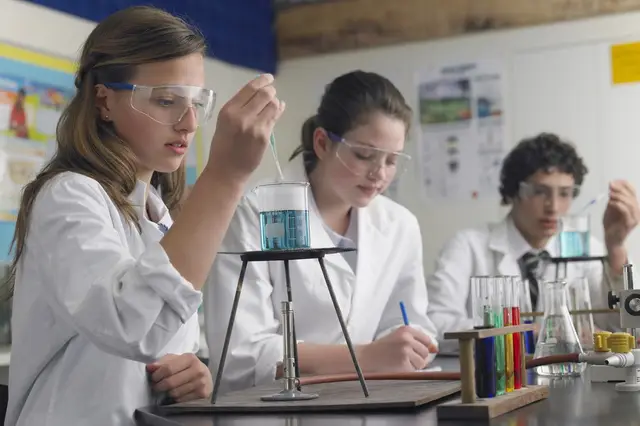
EDUCATION AND COLLEGE ADMISSIONS
4 minute read
Breaking Into the Lab: A High School Student's Guide to Gaining Lab Experience
Mar 5, 2024

The 10 Best Chemistry Competitions for High School Students
Jan 9, 2024

5 minute read
What can you do with a Chemistry degree?
Nov 30, 2023
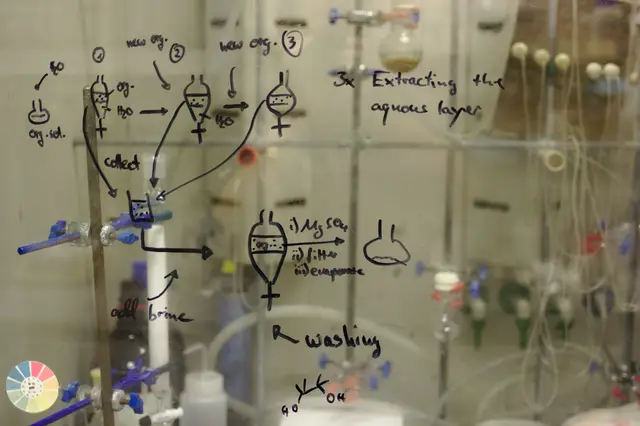
8 minute read
12 Chemistry Research and Passion Project Ideas For High School Students
Sep 18, 2023
Chemistry projects

Industrial Symbiosis And Circular Economy Applied To The Textile Industry With Realistic Considerations Of Socioeconomic, Political, Ethical, Scientific, and Technical Dimensions
Teeth whitening tools and its effects on teeth and gum health
The relationship between caffeine intake and sleep quality in high school student athletes
Resiniferatoxin: Mechanism in Treating Osteoarthritis Pain and Slowing Osteoarthritis Progression, Safety, and Efficacy
Similarities/Differences Between Bacterial/Animal/Plant Viruses And The Effects On Humans
Investigating Zinc Metalloprotease Protein Mutations in Clostridioides difficile through Multiple Sequence Alignment
Ready to start your own project?
Work 1 on 1 with an expert mentor on a project built around your passions.

Chemistry mentors

East Carolina University
PhD candidate

Purdue University

Boston University

Indiana University

Illinois Institute of Technology

University of North Carolina - Chapel Hill (UNC Chapel Hill)

Yale University

New York Medical College
MD candidate

University of Pennsylvania (UPenn)
DVM candidate

Duke University

New York University (NYU)

Princeton University

Massachusetts Institute of Technology
MBA/PhD candidate

University of California Berkeley (UC Berkeley)
OD candidate
Chemistry scholars

Project: “Similarities/Differences Between Bacterial/Animal/Plant Viruses And The Effects On Humans“

Project: “Scientific overview of CoVs“

Project: “Nutritional Status of Sickle Cell Disease Patients: A Literature Review“

Project: “African Herbal Remedies: The Healing Abilities of Nature's Gift“

Project: “Could the exoplanets in the Trappist-1 system support organic based life, based on the orbital distances from their star?“

Project: “Unlimited Energy: 24/7 Renewable Energy Source“
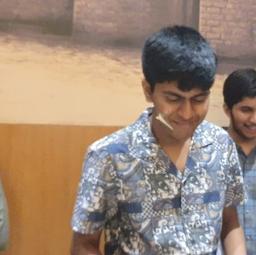
Project: “A Comprehensive Analysis of the Behavior of Rubber Bands and Rubber-like Polymers“

Project: “Teeth whitening tools and its effects on teeth and gum health“

Project: “The relationship between caffeine intake and sleep quality in high school student athletes“

Project: “Industrial Symbiosis And Circular Economy Applied To The Textile Industry With Realistic Considerations Of Socioeconomic, Political, Ethical, Scientific, and Technical Dimensions“

Project: “Environmental Sustainability: Using nature-based technologies to help sequester carbon and fight climate change“

Project: “Lamiaceae: Medicinal Potential & Developments“

Project: “Antimatter: Storage and Applications“

Project: “A review of the development of synthesis and catalytic applications of inorganic-organic hybrid nanomaterials: silica and graphene oxide“

Project: “Resiniferatoxin: Mechanism in Treating Osteoarthritis Pain and Slowing Osteoarthritis Progression, Safety, and Efficacy“
100+ Great Chemistry Research Topics
Table of contents
- 1 What are the best chemistry research topics?
- 2 5 Tips for Writing Chemistry Research Papers
- 3 Chemical Engineering Research Topics
- 4 Organic Сhemistry Research Topics
- 5 Іnorganic Сhemistry Research Topics
- 6 Biomolecular Сhemistry Research Topics
- 7 Analytical Chemistry Research Topics
- 8 Computational Chemistry Research Topics
- 9 Physical Chemistry Research Topics
- 10 Innovative Chemistry Research Topics
- 11 Environmental Chemistry Research Topics
- 12 Green Chemistry Research Topics
- 13.1 Conclusion
Do you need a topic for your chemistry research paper? Are you unsure of where to start? Don’t worry – we’re here to help. In this post, we’ll go over a series of the best chemistry research paper topics as well as Tips for Writing Chemistry Research Papers on different topics. By the time you finish reading this post, you’ll have plenty of ideas to get started on your next research project!
There are many different subfields of chemistry, so it can be tough to find interesting chemistry topics to write about. If you’re struggling to narrow down your topic, we’ll go over lists of topics in multiple fields of study.
What are the best chemistry research topics?
Doing research is important to help scientists learn more about the world around us. By researching different compounds and elements, we can learn more about how they interact with one another and how they can be used to create new products or improve existing ones.
There are many different topics that you can choose to research in chemistry. Here are just a few examples:
- The history of chemistry and how it has evolved over time
- How different chemicals react with one another
- How to create new compounds or improve existing ones
- The role of chemistry in the environment
- The health effects of different chemicals
5 Tips for Writing Chemistry Research Papers
Once you have chosen a topic for your research paper , it is important to follow some tips to ensure that your paper is well-written and accurate. Here are a few tips to get you started:
- Start by doing some background research on your topic. This will help you understand the basics of the topic and give you a good foundation to build your paper on.
- Make sure to cite all of the sources that you use in your paper. This will help to show where you got your information and will also help to add credibility to your work.
- Be sure to proofread your paper before you submit it. This will ensure that there are no errors and that your paper is clear and concise.
- Get help from a tutor or friend if you are struggling with your paper. They may be able to offer helpful advice or feedback.
- Take your time when writing your research paper . This is not a race, and it is important to make sure that you do a good job on your research.
By following these tips, you can be sure that your chemistry research paper will be a success! So what are you waiting for? Let’s go over some of the best research paper topics out there.
Chemical Engineering Research Topics
Chemical Engineering is a branch of engineering that deals with the design and application of chemical processes. If you’re wondering how to choose a paper topic, here are some ideas to inspire you:
- How to create new alloy compounds or improve existing ones
- The health effects of the food industry chemicals
- Chemical engineering and sustainable development
- The future of chemical engineering
- Chemical engineering and the food industry
- Chemical engineering and the pharmaceutical industry
- Chemical engineering and the cosmetics industry
- Chemical engineering and the petrochemical industry
These are just a few examples – there are many more possibilities out there! So get started on your research today. Who knows what you might discover!

Organic Сhemistry Research Topics
Organic chemistry is the study of carbon-containing molecules. There are many different organic chemistry research topics that a student could choose to focus on and here are just a few examples of possible research projects in organic chemistry:
- Investigating new methods for synthesizing chiral molecules
- Studying the structure and reactivity of carbon nanotubes
- Investigating metal complexes with organometallic ligands
- Designing benzene derivatives with improved thermal stability
- Exploring new ways to control the stereochemistry of chemical reactions
- Studying the role of enzymes in organic synthesis
- Investigating new strategies for combating drug resistance
- Developing new methods for detecting explosives residues
- Studying the photochemistry of organic molecules
- Studying the behavior of organometallic compounds in biological systems
Іnorganic Сhemistry Research Topics
Inorganic Chemistry is the study of the chemistry of materials that do not contain carbon. Unlike other chemistry research topics, these include elements such as metals, minerals, and inorganic compounds. If you are looking for inorganic chemistry research topics on inorganic chemistry, here are some ideas to get you started:
- How different metals react with one another
- How to create new alloys or improve existing ones
- The role of inorganic chemistry in the environment
- Inorganic chemistry and sustainable development
- The future of inorganic chemistry
- Inorganic chemistry and the food industry
- Inorganic chemistry and the pharmaceutical industry
- Atomic structure progressive scale grading
- Inorganiс Сhemistry and the cosmetics industry
Biomolecular Сhemistry Research Topics
Biomolecular chemistry is the study of molecules that are important for life. These molecules can be found in all living things, from tiny bacteria to the largest animals. Researchers who work in this field use a variety of techniques to learn more about how these molecules function and how they interact with each other.
If you are looking for essential biomolecular chemistry research topics, here are some ideas to get you started:
- The structure and function of DNA
- The structure and function of proteins
- The role of carbohydrates in the body
- The role of lipids in the body
- How enzymes work
- The role of biochemistry in heart disease
- Cyanides and their effect on the body
- The role of biochemistry in cancer treatment
- The role of biochemistry in Parkison’s disease treatment
- The role of biochemistry in the immune system
The possibilities are endless for someone willing to dedicate some time to research.
Analytical Chemistry Research Topics
Analytical Chemistry is a type of chemistry that helps scientists figure out what something is made of. This can be done through a variety of methods, such as spectroscopy or chromatography. If you are looking for research topics, here are some ideas to get you started:
- How food chemicals react with one another
- Mass spectrometry
- Analytical aspects of gas and liquid chromatography
- Analytical chemistry and sustainable development
- Atomic absorption spectroscopy methods and best practices
- Analytical chemistry and the pharmaceutical industry in Ibuprofen consumption
- Analytical chemistry and the cosmetics industry in UV protectors
- Dispersive x-ray analysis of damaged tissues
Analytical chemistry is considered by many a complex science and there is a lot yet to be discovered in the field.

Computational Chemistry Research Topics
Computational chemistry is a way to use computers to help chemists understand chemical reactions. This can be done by simulating reactions or by designing new molecules. If you are looking for essential chemistry research topics in computational chemistry, here are some ideas to get you started:
- Molecular mechanics simulation
- Reaction rates of complex chemical reactions
- Designing new molecules: how can simulation help
- The role of computers in the study of quantum mechanics
- How to use computers to predict chemical reactions
- Using computers to understand organic chemistry
- The future of computational chemistry in organic reactions
- The impacts of simulation on the development of new medications
- Combustion reaction simulation impact on engine development
- Quantum-chemistry simulation review
Computers are cutting-edge technology in chemical research and this relatively new field of study has a ton yet to be explored.
Physical Chemistry Research Topics
Physical chemistry is the study of how matter behaves. It looks at the physical and chemical properties of atoms and molecules and how they interact with each other. If you are looking for physical chemistry research topics, here are some ideas to get you started:
- Standardization of pH scales
- Structure of atom on a quantum scale
- Bonding across atoms and molecules
- The effect of temperature on chemical reactions
- The role of light in in-body chemical reactions
- Chemical kinetics
- Surface tension and its effects on mixtures
- The role of pressure in chemical reactions
- Rates of diffusion in gases and liquids
- The role of entropy in chemical reactions
Here are just a few samples, but there are plenty more options! Start your research right now!
Innovative Chemistry Research Topics
Innovative chemistry is all about coming up with new ideas and ways to do things. This can be anything from creating new materials to finding new ways to make existing products. If you are looking for ground-breaking chemistry research topics, here are some ideas to get you started:
- Amino acids side chain effects in protein folding
- Chemistry in the production of nanomaterials
- The role of enzymes in chemical reactions
- Photocatalysis in 3D printing
- Avoiding pesticides in agriculture
- Combining chemical and biological processes
- Gene modification in medicinal chemistry
- The role of quantum mechanics in chemical reactions
- Astrochemical research on extraterrestrial molecules
- Spectroscopy signatures of pressurized organic components
If you need a hand, there are several sites that also offer research papers for sale and can be a great asset as you work to create your own research papers.
Whatever route you decide to take, good luck! And remember – the sky’s the limit when it comes to research! So get started today and see where your studies may take you. Who knows, you might just make a breakthrough discovery!
Environmental Chemistry Research Topics
Environmental Chemistry is the study of how chemicals interact with the environment. This can include anything from the air we breathe to the water we drink. If you are looking for environmental chemistry research topics, here are some ideas to get you started:
- Plastic effects on ocean life
- Urban ecology
- The role of carbon in climate change
- Air pollution and its effects
- Water pollution and its effects
- Chemicals in food and their effect on the body
- The effect of chemicals on plant life
- Earth temperature prediction models
A lot of research on the environment is being conducted at the moment because the environment is in danger. There are a lot of environmental problems that need to be solved, and research is the key to solving them.
Green Chemistry Research Topics
Green chemistry is the study of how to make products and processes that are environmentally friendly. This can include anything from finding new ways to recycle materials to developing new products that are biodegradable. If you are looking for green chemistry research topics, here are some ideas to get you started:
- Recycling and reuse of materials
- Developing biodegradable materials
- Improving existing recycling processes
- Green chemistry and sustainable development
- The future of green chemistry
- Green chemistry and the food industry
- Green chemistry and the pharmaceutical industry
- Green chemistry and the cosmetics industry
A more environmentally friendly world is something we all aspire for and a lot of research has been conducted on how we can achieve this, making this one of the most promising areas of study. The results have been varied, but there are a few key things we can do to make a difference.
Controversial Chemistry Research Topics
Controversial chemistry is all about hot-button topics that people are passionate about. This can include anything from the use of chemicals in warfare to the health effects of different chemicals. If you are looking for controversial topics to write about , here are some ideas to get you started:
- The use of chemicals in warfare
- Gene modification in human babies
- Bioengineering
- How fast food chemicals affect the human brain
- The role of the government in regulating chemicals
- Evolution of cigarette chemicals over time
- Chemical effects of CBD oils
- Antidepressant chemical reactions
- Synthetic molecules replication methods
- Gene analysis
Controversial research papers often appear in the media before it has been peer-reviewed and published in a scientific journal. The reason for this is that the media is interested in stories that are new, exciting, and generate a lot of debate.
Chemistry is an incredibly diverse and interesting field, with many controversial topics to write about. If you are looking for a research topic, consider the examples listed in this article. With a little bit of effort, you are sure to find a topic that is both interesting and within your skillset.
In order to be a good researcher, it is important to be able to think critically and solve problems. However, innovation in chemistry research can be challenging. When thinking about how to innovate, it is important to consider both the practical and theoretical aspects of your research. Additionally, try to build on the work of others in order to create something new and unique. With a little bit of effort, you are sure to be able to find a topic that is both interesting and within your skillset.
Happy writing!
Readers also enjoyed

WHY WAIT? PLACE AN ORDER RIGHT NOW!
Just fill out the form, press the button, and have no worries!
We use cookies to give you the best experience possible. By continuing we’ll assume you board with our cookie policy.
- Research Paper Guides
- Research Paper Topics
200+ Chemistry Research Topics for Papers
- Speech Topics
- Basics of Essay Writing
- Essay Topics
- Other Essays
- Main Academic Essays
- Basics of Research Paper Writing
- Miscellaneous
- Chicago/ Turabian
- Data & Statistics
- Methodology
- Admission Writing Tips
- Admission Advice
- Other Guides
- Student Life
- Studying Tips
- Understanding Plagiarism
- Academic Writing Tips
- Basics of Dissertation & Thesis Writing
- Essay Guides
- Formatting Guides
- Basics of Research Process
- Admission Guides
- Dissertation & Thesis Guides

Table of contents
Use our free Readability checker
Do you find identifying suitable chemistry research topics difficult? You are not alone! Many students consider it challenging and time-consuming to choose an interesting chemistry topic for a research paper. In this blog post, we will discuss various research topics in chemistry to help simplify your research process. Continue reading to familiarize yourself with ideas from different fields and academic levels. Apart from defining research topics and discussing how to select one, we have provided examples to help kick-start your research project or assignments. Got a deadline approaching fast? Entrust your chemistry research paper to professional writers. Our academic service proceeds all ‘ write my paper for me ’ inquiries quickly and efficiently. Get your paper written now by an expert!
What Are Chemistry Research Topics?
Chemistry is a field of science that covers the structure, composition, and properties of elements and compounds. As a student taking this subject, you will encounter multiple experiments, chemical reactions, and analytical study methods. This branch of science can be subdivided into multiple areas, including organic, inorganic, biochemistry, physical, analytical, and nuclear science, among others. Chemistry research paper topics are talking points related to the branches of science outlined above. To ensure that all learning objectives are met, instructors may require students to work on various topics in chemistry. You would be expected to source your chemistry research topics ideas from all possible branches. In one instance, your topic could be associated with analytical science, in another - with practical discussions, which is an entirely different thing despite both areas being categorized as chemistry subfields.
Characteristics of Good Chemistry Research Topics
Selecting a good research topic for chemistry plays a vital role in determining the probability of success when writing your paper. It is, therefore, important to know the characteristics of good chemistry topics for a research paper. Although you can derive discussions from many sub-areas, these research topic ideas share many common characteristics. A great research topic should be:
- Precise, meaningful, clear, and straightforward
- Analytical and researchable using logical methodologies
- Of theoretical or practical significance
- Supported by numerous academic evidence and sources.
How to Choose a Chemistry Research Topic?
Chemistry is a broad subject with multiple research areas. If you are not keen enough, you may easily get lost in its variety and fail to select a congenial title. So, how do you deal with this issue? In a nutshell, the process comes down to two aspects – your passion and competence. Below are step-by-step guidelines that you can follow to determine interesting topics about chemistry:
- Pick chemistry research topics with your knowledge capabilities in mind. Do not choose a topic that is beyond your academic level.
- Choose something that is interesting to you. If you are fascinated with the selected topic, you will find responding to the research questions to be much simpler.
- Select a research title that is convenient to work on due to the sufficient amount and availability of existing evidence and references.
- Ensure that the chosen chemistry topics for research paper are within the subfield you are majoring in and that it meets your instructor’s requirements.
Once you select the most appropriate title, see how to write a research paper like an expert.
Chemistry Research Paper Topics List
There are many research topics for chemistry to choose from. In this section, we have compiled examples of the best topics from various sub-areas. Below is a list of chemistry research topics for papers:
- Latest developments in DNA technology.
- Negative effects of using pesticides in food production.
- Importance and potential drawbacks of using fertilizer in commercial agriculture.
- Acids and bases: composition, properties, and applications.
- Industrial chemicals and environmental pollution.
- Dangers and side effects of using ibuprofen.
- Acid-base neutralization process.
- Air pollution implication on global warming and climate change.
- Ageing and the brain.
- Catalytic reaction mechanisms.
The chemistry research topics list above is created by drawing ideas from different sub-areas, thus covering a significant part of scholars’ inquiries.
Interesting Topics in Chemistry
In some instances, one may select a research topic because it is just fascinating. There are interesting chemistry topics that can explain intriguing phenomena in your day-to-day life. Alternatively, you can also opt for something related to essential issues in the current society. Here are sample chemistry interesting topics you can research into:
- Composition and effects of e-cigarettes.
- Food dye composition.
- Measuring electrical conductivity in a salt solution.
- How to change a penny’s color to gold.
- The scientific explanation of foam formation.
- Silicon usage in cosmetic surgery.
- Evidence and application of surface tension in day-to-day life.
- Examining pesticide residue in farm products from different grocery stores.
- How does molecule composition affect the physical appearance of things?
- Sodium metal reaction on water surfaces.
- How to separate dissolved sugar from water.
- How to clean up oil spills at sea.
- Rust formation on metal surfaces.
- How to chemically remove rust from stainless steel.
- The science behind turning boiling water into “snow” in a cold winter.
Easy Chemistry Research Topics
The science studied in high schools is way simpler compared to postgraduate one. You can find easy chemistry topics to research if you focus on certain academic levels and sub-areas. For example, physical chemistry has easy chemistry topics to do research paper on. On the other side, inorganic or analytical sub-areas tend to offer scientific research research topics that are more technical. The list below outlines easy topic examples you can pick from:
- Determining the percentage composition of oxygen in the air.
- Patterns in the periodic table.
- Atomic theory: primary principles and applications.
- Chemical and physical properties of starch.
- Determining the pH level of various liquids.
- Properties of acids and bases.
- Why is glass the preferred material in laboratories?
- Balancing chemical equations.
- Analyzing different chemical bonds.
- Alkali metals and their properties.
- General characteristics of metals.
- Noble gasses: properties and reaction characteristics.
- Water purification methods.
- The periodic table: its historical background.
- Alkaline earth metals: properties and reactivity.
Innovative Research Topics in Chemistry
Innovative chemistry topics for research paper relate to new ideas and ways to go about things. Using these ground-breaking topics related to chemistry, you can discuss new materials or methodologies. If you are interested in innovative research topics, here are some examples you can borrow from:
- Gene modification in medical chemistry .
- Improved cancer treatment using bacteria-based biohybrid microrobots.
- New methods used to detect explosive residues.
- Studying the molecular makeup of particles in space.
- Substitute for pesticides in farming.
- Nanophotonics in aeronautics.
- Nanomaterials production process and techniques.
- Clean energy alternatives for fossil fuels.
- Photocatalysis usage in 3D printing technology.
- Biodegradable polymers as alternatives for plastics.
- Silicon dioxide usage in solar cells.
- Chemical reactions in lithium-ion batteries.
- Self-healing concrete: basic principles.
- New materials for lightweight planes and vehicles.
- Polymer analysis in a restricted environment.
Cool Chemistry Research Topics
Sometimes, our title selection might be guided by how cool and fun the study results will be. If you are looking for cool chemistry topics to research on, you are in the right place. We have compiled some cool chemistry topics for you to choose from.
- How World War II influenced computational chemistry.
- How do chemicals in our brains create different moods?
- Composition and properties of laughing gas.
- European alchemy: historical background and its impact on modern science.
- Developing a film at home: chemicals required and process.
- Why lemon juice stops apples from browning.
- Different flame colors and their scientific explanation.
- Using a potato to light a bulb.
- Principles of chromatography.
- Utilizing cloud seeding in alleviating drought conditions.
- Finding iron in a mixture of metals.
- Gas chromatography: how it works and its applications.
- Application of vibrational spectroscopy.
- Surface tension and the dish soap experiment.
- How to make a homemade water filter.
Have you spotted any ideas but can’t get the research process started? Contact our professional writing service where you can pay for research paper and be sure that you will get outstanding results within your deadline.
Intriguing Chemistry Topics for Research
There are many chemistry topics to write about. However, not all topics are intriguing (and frankly, most are the other way around). Below are topic examples that can instantly draw readers’ attention:
- Non-existing chemical compounds.
- Molecular structure of artificial honey as compared to natural honey.
- Stem cell studies: ethical implications.
- Principles of polymerase chain reaction and DNA replication.
- Organic chemistry applications in our daily living.
- Chemicals as weapons of mass destruction.
- How does adding sugar to a soft drink affect its density?
- Synthetic molecules in the pharmaceutical industry .
- Aerosol formation and its application in body spray manufacture.
- Analyzing the gasoline production process.
- Benzene molecular structure and its use in the cosmetic industry.
- Why are 96,000,000 black balls dumped into the LA reservoir?
- Water recycling methods.
- The discovery of oxygen.
- Importance of esters in our day-to-day living.
If you closely review the research topics for chemistry paper above, you will find them arousing your curiosity much more than the ones in other sections. These topics will challenge your initial line of thinking or introduce you to the concepts that just stand out.
Unique Chemistry Research Topics
There are some chemistry paper topics that are rarely worked on by students. People ignore these topics because they are either complex or lack adequate conclusive information from previous studies. If you are brave enough and wish to have a unique presentation, you can consider the research topics in chemistry below:
- Organosilicon compounds and their use.
- Nucleophiles and electrophiles.
- Molecular structure of Teflon and its industrial application.
- Sodium azide usage in automobile airbags.
- Dangers of COVID-19 tests that use sodium azide as the reaction reagent.
- Chemical composition of steroids and their effects on human beings.
- Artificial diamond production process.
- Insulin production biotechnology.
- Evolution of lethal injection.
- Effects of chiral class drugs on human health.
- Chemical residues in livestock.
- Artificial organs and their potential implication on transplantation.
- Role of nanoreactors in nanotechnology and biotechnology.
- Dangers of phosgene to human health.
- Production of dry ice.
Popular Chemistry Research Paper Topics
Unlike the unique study subjects discussed in the previous section, popular topics relating to chemistry are widely researched. Students favor these topics due to reasons like their simplicity, availability of adequate evidence, and their relevance to current issues. You can pick a hot topic in chemistry from the list below:
- Metal oxide usage in electronics.
- Importance of nitrogen to human survival.
- How do temperature changes affect chemical reactions?
- Lewis structure for ionic compounds.
- Analysis of the hydrophobic effect.
- Hydrogen as an alternative to fossil fuel.
- Application of thermodynamics law in our lives.
- pH level calculations and analysis.
- Gas laws and their application.
- Why is Earth viewed as a closed thermodynamic system?
- Redox reactions and their industrial applications.
- Decomposition process of polymers.
- The anomalous expansion of water.
- Impact of fluoride ion on dental health .
- The use of lithium, magnesium, and calcium compounds in clinical medicine.
>> View more: Medical Research Paper Topics
Controversial Chemistry Topics for Papers
Just like in any other subject, there exist chemistry project topics that are controversial in nature. People are understandably more passionate about some subject matters compared to others. Discussions related to, for instance, chemical usage in battlefields and the health effects of using certain chemicals tend to attract heated debates. Below are some controversial topics in chemistry that you can write about:
- Biochemicals usage in warfare.
- Impact of fast-food chemicals on the human brain.
- Gene modification in human embryos.
- Bioconjugation techniques and how they are used in drug delivery.
- Synthetic molecules replication techniques.
- Use of lethal injection in execution of criminals.
- Ethical justification for euthanasia.
- Manufacture of chemical poisons.
- Fritz Haber’s controversial inventions.
- Artificial organs and their role in healthcare.
- Electromagnetic energy conversion to chemical energy.
- Dangers of using fertilizer in farming.
- Analyzing the water memory effect.
- Synthesis of food from non-edible items.
- Bio-inspired molecular machines and their applications.
Chemistry Research Ideas for Students
Students are often required to work on some chemistry project ideas to successfully complete their course. Depending on the sub-area one specializes in, and the academic level, research matters will vary significantly. For instance, chemistry undergraduate research project ideas are incomparable to highschool research titles. Some subject matters are only suitable for professional research. This section sorts the research ideas into their respective academic levels.

Chemistry Research Topics for High School
Chemistry research project ideas for highschool students are relatively easy compared to higher academic levels. The tasks are not very demanding in terms of the research methodologies used and the time required to complete them. At this level, students are introduced to the basic concepts of the subject. Common chemistry topics for high school are outlined in the list below.
- Acids and bases in the reduction-oxidation reaction.
- Importance of studying chemicals and chemical processes in high school.
- Ionization techniques for the mass spectrometry process.
- Avogadro’s Law: analysis, formulae, and application.
- Thermochemistry lab experiments.
- Laboratory safety rules.
- The hydrolysis analysis.
- Acids: structural composition, properties, and use.
- Noble gasses configuration.
- States of matter and their characteristics.
- Optimizing indoor plants life through chemistry.
- Role of enzymes in chemical and biological reactions.
- Thermal effects of chemical reactions.
- The law of multiple proportions in chemical reactions.
- Constant and changing variables in Boyle’s law .
Chemistry Research Topics for College Students
Chemistry project ideas for college often require students to dive deep into a subject. Rather than explaining the basic concepts, you may be instructed to apply them in addressing problems. A college chemistry project will require you to dedicate more time and conduct more research. Below are some of the title ideas for college students and undergraduates:
- How much energy is produced from burning nuts and chips?
- Dangers of using radon in construction and potential solutions.
- Chemical composition of aspirin and its effect on human physiology.
- Green chemistry application in the food industry.
- Phosphorescence versus fluorescence.
- Dihydroxyacetone phosphate conversion.
- Big data and biocomputing in chemical studies.
- Thermoelectric properties of materials.
- Artificial organic tissue development in laboratories.
- Nuclear fusion: primary concepts and applications.
- Power production process in lithium nickel batteries.
- Medico-biological importance of group 3B and 4B elements.
- Global cycle of biologically active elements.
- Importance of chemical knowledge in cancer treatment.
- Inorganic materials usage in the military.
Chemistry Research Topics in Different Fields
Chemistry can be divided into many sub-areas. Each subfield has interesting chemistry topics to research into. To choose a research topic in chemistry, you need to first determine a sub-area you would wish to specialize in. However, even within these fields, there are still many title options to choose from. To help reduce the confusion and simplify the selection process, we have categorized potential research discussions into their respective sub-areas.
Organic Chemistry Research Topics
Organic chemistry mainly involves studying the structure, composition, properties, and reaction of carbon-based compounds. It is among the most commercially applied subfields, which makes organic chemistry research paper topics very common. I am sure you must have encountered products manufactured using organic chemistry principles within your surroundings. If you wish to learn more about these products, you can explore these latest research topics in organic chemistry:
- Pain relief medicine: chemical structure and composition.
- Composition, use, and effects of polymers.
- Retin-A usage in acne treatment.
- Organic chemistry usage and application in daily life.
- Types of organic compounds isomerism.
- Aromatic hydrocarbons as industrial raw materials.
- Alcohol hydrophilicity in aqueous solutions.
- Physical and chemical properties of polyhydric alcohols.
- Synthetic polymer applications: synthetic fiber, Teflon, and isoprene rubber.
- Fetal alcohol syndrome: types and symptoms.
- Structure and properties of phenols.
- The application of organic chemistry in birth control.
- Nucleic acid stability.
- Parameters affecting proton chemical shifts.
- Structure and properties of lipids.
Inorganic Chemistry Research Topics
This branch deals with the study of structure, composition, and properties of materials that do not contain carbon. Research paper topics for inorganic chemistry focus on metals, minerals, and inorganic compounds. The list below compiles chemistry projects topics and ideas related to inorganic chemistry.
- How to create new and improve existing alloys.
- Implication of inorganic chemistry on the environment.
- Application of inorganic chemistry in the cosmetic industry.
- Interaction between sulfuric acid and organic materials.
- Lattice energy and enthalpy for different ionic bonds.
- Characteristics of different types of nucleosyntheses.
- Uniqueness of hydrogen bonds and polarity.
- Hard and soft acids and bases ( HSAB ) theory.
- Dalton’s Law: principles and applications.
- Structure of a gemstone and how it impacts its appearance.
- Relationship between inorganic and biochemistry.
- Parameters affecting Bronsted-Lowry acidity.
- Crystal field theory: analysis and disadvantages.
- Application of angular overlap model.
- Primary laws of photochemistry.
Analytical Chemistry Research Topics
The determination of the objects’ primary makeup of objects is the main interest of this branch. Various analytical methods, including spectroscopy, chromatography, and electroanalytical techniques, are often discussed in the subfield. As such, many analytical chemistry research paper topics focus on these or other analysis techniques. Below is a list of research topics on analytical chemistry:
- Analytical techniques used in forensic science.
- Examining the electroanalytical techniques.
- Importance of analytical chemistry to the environment.
- Miniaturization and its use in analyzing pharmaceutical substances.
- Evaluating the working principles of activation analysis.
- Gravimetric analysis principles.
- GMOs usage and their potential hazards to human health.
- Potentiometric measurement methods.
- Liquid and gas chromatography.
- Spectroscopy methods and their use in detecting and quantifying molecular and structural composition of samples.
- Dispersive X-ray analysis of tissues.
- Analytical methods for determining the side effects of ibuprofen usage.
- Benefits of the isomerism framework.
- Acid-base titration as a quantitative analysis technique.
- Application of spectroscopy in medicine.
Environment Chemistry Topics for Research
The apparent global warming and climate change threats have led to the development of a new area of study. This sub-area has project topics in chemistry that explore the impact of human activity on the environment and the potential solutions for slowing down and reversing the climate change process. Common environmental chemistry related topics include:
- Negative effects of deep-sea mining.
- Ground water contamination: causes, dangers, and potential solutions.
- Oil spillage and its effect on marine life.
- Effect of heat engines on the environment.
- Safe disposal of toxic waste.
- Global warming: causes and potential remedies.
- Potential alternatives to fossil fuels.
- Innovative methods to minimize pesticide usage in agriculture.
- Cultivated meat as an alternative to livestock farming.
- How efficient is artificial photosynthesis.
- The Chernobyl ecological disaster.
- Analysis of life-cycle assessment (LCA).
- Environmental benefits of using energy-saving lamps.
- Environmental pollution by nano toxins.
- Potential solutions for global warming.
Need more ideas on the environment? Check our list of the best environmental research topics for students.
Physical Chemistry Research Topics
Physical chemistry is the study of the behavior of matter. Physical chemistry topics for research papers focus on analyzing the physical and chemical properties of atoms and molecules and how they interact with each other. You can use a project topic on chemistry from the list below:
- Surface tension and its impact on mixtures.
- Diffusion of liquid and gasses.
- Reaction of bromine under UV rays.
- Pressure effect in chemical reactions.
- Bonding between atoms and molecules.
- Analyzing Schrodinger’s equation.
- Hess’s laws: principles and application.
- Effects of intermolecular forces on the melting point of a material.
- Entropy law of thermodynamics.
- Relationship between quantum mechanics and atomic orbitals.
- Chemical kinetics in pharmacy.
- Analyzing the physical and chemical indicators of milk.
- How to determine atoms’ electron configuration.
- Why isotopes exist.
- Determining the group based on its successive ionization energies.
Chemical Engineering Research Topics
In this section, we will discuss research topics of chemistry related to the design and application of chemical processes. Here are some of the chemical research project ideas that will impress your instructor:
- Chemical engineering concepts in the food production industry.
- Analyzing wastewater treatment techniques.
- Conversion of rocket fuel to energy.
- Analyzing different mixture separation techniques.
- Industrial application of chemical engineering concepts.
- Non-reactive mass balances and mass balance with reaction.
- Binary distillation and its application.
- Gas absorption usage in the chemical industry.
- Reaction kinetics in a plug flow reactor.
- Water splitting for hydrogen production.
- The application of MIMO theory in the control of chemical process operation.
- Chemical engineering applications in the healthcare sector.
- Nanofiltration member usages in pharmaceutical wastewater treatment.
- General overview of microfluidics.
- Production of high-quality foam.
Nuclear Chemistry Research Topics
A nuclear chemistry research project deals with radioactivity-related processes. You may encounter this branch of science in nuclear energy production, military applications, and even in the hospital. Some of the researchable topics in chemistry of nuclei transformation include:
- Computation of an element’s half-life.
- Radioactive elements in real life and how they are being used.
- Nuclear fusion: the process and its function.
- Types of radioactive decay.
- Effects of radiation on biological systems.
- Safe radioactive waste disposal.
- Application of nuclear science in the healthcare sector.
- Analyzing the three types of radiation.
- How to destroy toxic organic compounds using irradiation.
- Is there a possibility of cold fusion ever happening?
- Biological application of radiochemistry.
- Dangerous consequences of ionizing versus non-ionizing radiation.
- Optical chemo sensors: principles and applications.
- Interaction between water and radioactive materials.
- Radiation accident cases in human history.
There is a vast assortment of research ideas for your study on our platform. Be it biology research topics or nursing research paper topics , we have all of them here.
Bottom Line on Chemistry Research Topics
In sum, chemistry is a broad subject with multiple sub-areas. Depending on your preference, you can choose interesting chemistry research topics for papers from the many subfields. Apart from selecting a good research subject, also remember that is always mandatory to adhere to proper writing procedures! Besides, select chemistry essay topics that will keep you excited till the end of research, as you wouldn’t want to quit in the middle and switch to another topic. If you combine all provided tips together, you will definitely find it easy to select and work on research in chemistry topics.
Our academic writing service is always happy to help. Our platform was created by students who also struggled. So the writers deliver excellent papers focusing on fast and high-quality writing.

Joe Eckel is an expert on Dissertations writing. He makes sure that each student gets precious insights on composing A-grade academic writing.
You may also like

Education Related Topics
High School Chemistry Research Topics
High School Chemistry Research Topics : High-school chemistry offers an exciting opportunity for students to delve into the practical applications of this fascinating subject. By conducting experiments and studies, students can uncover real-life applications that bring chemistry concepts to life. When tasked with writing chemistry papers, students often prefer topics that are grounded in practicality rather than abstract theory. This approach allows them to engage with their research and feel a genuine sense of excitement about the results they can achieve. In this response, we present a list of research topics specifically curated for high school students, designed to ignite curiosity and provide practical applications within the realm of chemistry.
Investigating the Effectiveness of Different Household Cleaning Agents: Conduct experiments to compare and evaluate the efficiency of various household cleaning agents, such as vinegar, baking soda, or commercial cleaners, in removing common stains and dirt.
Analyzing the Acidic and Alkaline Properties of Common Foods: Investigate the pH levels of different foods commonly found in the kitchen and determine their acidic or alkaline nature. Explore the impact of food pH on taste and digestion.
Exploring the Efficiency of Natural Antioxidants in Food Preservation: Investigate the effectiveness of natural antioxidants, such as vitamin C or plant extracts, in preventing food spoilage. Compare their preservation abilities with traditional chemical preservatives.
Examining the Effects of Temperature on the Rate of Chemical Reactions: Explore the relationship between temperature and reaction rates by conducting experiments with various reactions, such as the reaction between vinegar and baking soda or the reaction between hydrochloric acid and magnesium.
Investigating the Effect of Different Variables on Seed Germination: Conduct experiments to explore the impact of variables like light, temperature, and moisture on seed germination. Analyze how these factors affect the growth and development of plants.
Analyzing the Chemical Composition of Different Brands of Sports Drinks: Use chemical tests and analysis techniques to compare the composition of various sports drinks. Determine the presence of electrolytes, sugars, and other components, and evaluate their potential benefits for athletes.
Exploring the Effects of Different Factors on the Rate of Rusting: Investigate how factors such as exposure to moisture, presence of salt, or application of protective coatings affect the rate of rusting on different types of metals.
Investigating the Chemical Properties of Natural Indicators: Explore the chemical properties of natural indicators, such as red cabbage juice or turmeric, and determine their ability to detect the pH of different substances.
Analyzing the Effects of Different Variables on Crystal Growth: Investigate the impact of variables such as temperature, concentration, and stirring on the growth and formation of crystals from common substances like salt or sugar.
Investigating the Chemistry of Food Coloring: Analyze the chemical components and behavior of food coloring substances commonly used in baking and cooking. Explore the effects of temperature, pH, and other factors on their stability and color intensity.
Chemistry Research Topics for High School Students
Detection of heavy metal in plants
Air pollution measurements
Optimizing indoor plants life through chemistry
Oxygen discovery
Artificial diamonds
Water purification systems
Chemical applications to human health
Periodic table history
Thermal effects of various chemical reactions
Chemical applications in industries
Acids properties
Introduction to metals
Metals compounds
Chemical industries: evolution and developments
Chemistry uses in medicine or medical technology
By selecting one of these research topics, high school students can embark on a practical and engaging journey in the world of chemistry. These projects offer opportunities for hands-on experimentation, data collection, and analysis, allowing students to uncover fascinating insights and develop a deeper appreciation for the real-life applications of chemistry.

Steve George is Blogger, a marketer and content writer. He has B.A. in Economics from the University of Washington. Read more about Mzuri Mag .
- Chemistry Research Topics for Undergraduates
- Chemistry Research Topics for College
- Organic Chemistry Research Topics
- Analytical Chemistry Research Topics
- Welcome Back To School Messages to Students
- Mzuri Mag - Education Ideas & Resources for Educators
Overview of High School Chemistry Topics
Chem tools plus practice problems and quizzes are included
- Chemical Laws
- Periodic Table
- Projects & Experiments
- Scientific Method
- Biochemistry
- Physical Chemistry
- Medical Chemistry
- Chemistry In Everyday Life
- Famous Chemists
- Activities for Kids
- Abbreviations & Acronyms
- Weather & Climate
- Ph.D., Biomedical Sciences, University of Tennessee at Knoxville
- B.A., Physics and Mathematics, Hastings College
Are you confused by all the topics in high school chem class? Here is an overview of what is studied in high school chem, with links to essential chem resources and worked chem problems.
Introduction to Chemistry
To study high school chem, it's a good idea to know what chem is.
- What Is Chem?
- What Is the Scientific Method?
Math Basics
Math is used in all the sciences, including high school chem class. To learn chem, you need to understand algebra, geometry, and some trig, as well as be able to work in scientific notation and perform unit conversions.
- Accuracy and Precision
- Significant Figures
- Scientific Notation
- Physical Constants
- Metric Base Units
- Derived Metric Units
- Metric Prefixes
- How to Cancel Units
- Temperature Conversions
- Calculate Experimental Error
Atoms and Molecules
Atoms are the basic building blocks of matter. Atoms join together to form compounds and molecules.
- Atom Basics
- Atomic Mass and Atomic Mass Number
- Types of Chemical Bonds
- Ionic and Covalent Bonds
- Oxidation Numbers
- Lewis Structures or Electron Dot Models
- Molecular Geometry
- What Is a Mole?
- More About Molecules and Moles
- Law of Multiple Proportions
Stoichiometry
Stoichiometry describes the proportions between atoms in molecules and reactants/products in chemical reactions. You can use this information to balance chemical equations.
- Types of Chemical Reactions
- Balance Equations
- Balance Redox Reactions
- Gram to Mole Conversions
- Limiting Reactant and Theoretical Yield
- Mole Relations in Balanced Equations
- Mass Relations in Balanced Equations
- States of Matter
The states of matter are defined by the structure of matter as well as whether it has a fixed shape and volume. Learn about the different states and how matter transforms itself from one state to another.
- Phase Diagrams
Chemical Reactions
There are several types of chemical reactions that can occur.
- Reactions in Water
- Types of Inorganic Chemical Reactions
Periodic Trends
The properties of the elements exhibit trends based on the structure of their electrons. The trends or periodicity can be used to make predictions about elements.
- Periodic Properties and Trends
- Element Groups
It's important to understand how mixtures behave.
- Solutions, Suspensions, Colloids, Dispersions
- Calculating Concentration
Gases exhibit special properties.
- Ideal Gases
- Ideal Gas Law Problems
- Boyle's Law
- Charles' Law
- Dalton's Law of Partial Pressures
Acids and Bases
Acids and bases are concerned with the actions of hydrogen ions or protons in aqueous solutions.
- Acid and Base Definitions
- Common Acids and Bases
- Strength of Acids and Bases
- Calculating pH
- Salt Formation
- Henderson-Hasselbalch Equation
- Titration Basics
- Titration Curves
Thermochemistry and Physical Chem
Learn about the relationships between matter and energy.
- Laws of Thermochemistry
- Standard State Conditions
- Calorimetry, Heat Flow, and Enthalphy
- Bond Energy and Enthalpy Change
- Endothermic and Exothermic Reactions
- What Is Absolute Zero?
Matter is always in motion. Learn about the motion of atoms and molecules, or kinetics.
- Factors That Affect Reaction Rate
- Chemical Reaction Order
Atomic and Electronic Structure
Much of the chem that you learn is associated with electronic structure, since electrons can move around much more easily than protons or neutrons.
- Valences of the Elements
- Aufbau Principle and Electronic Structure
- Electron Configuration of the Elements
- Quantum Numbers and Electron Orbitals
- How Magnets Work
Nuclear Chem
Nuclear chemistry is concerned with the behavior of protons and neutrons in the atomic nucleus.
- Radiation and Radioactivity
- Isotopes and Nuclear Symbols
- Rate of Radioactive Decay
- Atomic Mass and Atomic Abundance
- Carbon-14 Dating
Chem Practice Problems
- Index of Worked Chem Problems
- Printable Chem Worksheets
Chem Quizzes
- How to Take a Chem Test
- Atom Basics Quiz
- Atomic Structure Quiz
- Acids and Bases Quiz
- Chemical Bonds Quiz
- Changes in State Quiz
- Compound Naming Quiz
- Element Number Quiz
- Element Picture Quiz
- Units of Measurement Quiz
General Chem Tools
- Periodic Table . Use the periodic table to make predictions about element properties. Click on any element symbol to get facts about the element.
- Chem Glossary . Look up the definitions of unfamiliar chem terms.
- Chemical Structures . Find the structures for molecules, compounds, and functional groups.
- Chemistry 101 - Introduction & Index of Topics
- Topics Typically Covered in Grade 11 Chemistry
- College Chemistry Topics
- Teach Yourself Chemistry Today
- Chemistry Vocabulary Terms You Should Know
- A to Z Chemistry Dictionary
- General Chemistry Topics
- Atoms and Atomic Theory - Study Guide
- 20 Practice Chemistry Tests
- AP Chemistry Course and Exam Topics
- Overview of the Branches of Chemistry
- A List of Common General Chemistry Problems
- Clickable Periodic Table of the Elements
- What Is a Chemical Reaction?
- Essential Element Facts in Chemistry
- Basic Model of the Atom and Atomic Theory
Final Summer I 2024 Application Deadline is June 2, 2024.
Click here to apply.

Featured Posts

10 Reasons Why You Should Apply to APA’s Internship for High School Students

Stanford STaRS Internship Program - Is It Worth It?

How to Show Demonstrated Interest - 8 Tips for College Admissions

10 Free Summer Math Programs for High School Students

10 Online Summer Camps for Middle School Students

6 Entrepreneurship Internships that You Should Check out as a High School Student

10 Free Biology Summer Programs for High School Students

10 Free Programs for High School Students in California

NASA's High School Aerospace Scholars - 7 Reasons Why You Should Apply

10 Film Internships for High School Students
10 Great Summer Chemistry Programs for High School Students
Chemistry is one of the most popular STEM majors, and getting into a renowned institute for the subject boosts your shot at gaining research experience, mentorship, and networking opportunities. To make your application stand out, you must demonstrate interest, as well as experience, to stand a chance at an acceptance from your dream school. You can do this by participating in chemistry competitions such as USNCO , picking up a related passion project , and participating and learning in chemistry programs.
We’ve compiled a list of 10 great summer chemistry programs for high school students - check it out!
1. MIT’s Research Science Institute (RSI)
RSI is a highly competitive (and prestigious) program that covers an array of STEM subjects - and chemistry is no exception! It has an acceptance rate of less than 5% so you’ll definitely find yourself among the brightest of peers and mentors!
This is a research-based summer program which invites independent research in chemistry while engaging in college-level chemistry courses.
Here’s a chemistry project that previous RSI participants worked on - The Monoreduction of Diketones and its Application towards the Total Synthesis of Kalmanol (2006) by Kenneth I. Brewer. You can view more such projects here .
To make the most of this program, you are expected to keep yourself aware of the latest literature in the field of chemistry, design a research plan from scratch, and work on oral and written presentations of your findings, all under the guidance of the brightest scholars in the world.
Note : All RSI participants can reasonably expect an acceptance from MIT for their undergraduate program
Cost : Free of cost, stipend provided
Location: MIT Campus
Application deadline: January 15, 2023, for US citizens, and March 15 for International Students
Program dates: June 26 to August 6, 2023 (tentative)
Eligibility: All high school juniors can apply
2. Lumiere Research Scholar Program , Chemistry Track
Lumiere was founded by researchers at Harvard and Oxford. Hundreds of ambitious high school students do chemistry research through the Lumiere Research Scholar Programs. Each student is paired with a top PhD and works with their mentor 1-1 to produce a university-level research paper.
The programs are entirely virtual and vary in duration based on the student’s end goal with respect to how much of a deep dive they would prefer. The research opportunities range from
Organic & Inorganic Chemistry, to Chemical Kinetics & Dynamics.
Also, check out the Lumiere Research Inclusion Foundation , a non-profit research program for talented, low-income students.
Location: Virtual
Application deadline:
Applications open throughout the year for the four cohorts - they are due in February, May, September, and December, you can apply here !
Program start dates:
There are four cohorts that run throughout the year, namely the spring, summer, winter, and fall cohorts.
Eligibility: High school students
3. Summer Scholar Program at the Illinois Insitute of Technology
Another great program that is free of cost is Illinois Tech University’s 8-week annual Summer Scholar Program. If you have already displayed a strong grasp of chemistry and want to work in a research lab, then the Department of Chemistry (which hosts this program) had solid research options for you program is for high-achieving high school students who display a passion for chemistry and have the aptitude to work in a research lab.
Research areas in the program include bioanalytical chemistry, computational chemistry and biochemistry, environmental chemistry, forensic chemistry, and medicinal chemistry related to energy and sustainability science, materials science, sensor science and technology, computational science, data science, bioanalysis, and health with real-world applications.
We hope you love working in a lab because you can expect to work for 30 hours a week for 8-10 weeks in the summer.
Location: Mies Campus, Chicago, IL
Cost: Free of cost
Application deadline: March 30, 2023
Program dates: May 15 - July 10, 2023 (tentative)
Eligibility: Rising 10th-12th graders who have taken at least one chemistry course in high school.
4. Applied Research Innovations in Science and Engineering (ARISE)
A 7-week full-day summer program, ARISE is offered by NYU, and combines college-level workshops and lab research in chemical engineering, in addition to other subjects. If you choose to participate in the program, you will be expected to engage in college-level research, expository writing, scientific methods, professional development, and ethics. Alongside these skills and exposure to academic research, you also receive presentation and public speaking training. And as part of the program’s conclusion, you and your peers present your research findings to NYU faculty and graduate students, ARISE, peers, other academic experts, family members, and friends at the ARISE’s concluding colloquium.
Location: Tandon and Washington Square campuses, NYC
Cost: Free of cost, a stipend of $750
Application deadline: March 1, 2023
Program dates: June 28 – August 11, 2023
Eligibility: High school juniors and sophomores residing in NYC can apply
5. Chemistry Research Academy at Penn University
Penn University hosts the Chemistry Research Academy annually, an on-campus summer program. CRA is aimed at providing students with foundational knowledge that is necessary for cutting-edge research in the field of chemistry, right before their college careers. You can expect to do the following activities and work on a capstone project. If you’re worried about not knowing where to start, you will be mentored and guided by top scholars in your field at Penn. The Academy curriculum also includes lectures, lab experience, presentations, trips and tours, and group discussions. As for the cherry on the top, you can also choose to work on a capstone project - this is particularly useful if you plan on pursuing research/academia right after college. The capstone project provides you with guidance through a process to choose and plan your own independent research project using Penn’s online resources. You will leave with a plan you can use for entering a science fair such as ISEF or STS, or for meeting your high school’s independent research requirements.
This program is perfect for any student looking to create a strong foundation in chemistry and scientific research!
You are expected to put in about 6 hours of work each day, from Monday to Friday. As for specific timings and other details, you can find the complete schedule on the official website .
Location: Penn University Campus
Cost: $9,700 + $150 application fee. Additionally, you are eligible for a full scholarship if you attend a School District of Philadelphia public or charter high school as part of the Penn Summer Scholarship .
Application deadline: March 31 for international students, and May 1 for domestic students.
Program dates: July 9 – July 29, 2023
Eligibility: High school students who have completed at least one year of high school chemistry before applying to the program.
6. Science for Youth Intensive Program (SYIP)
Looking for an internship cum learning program in chemistry? UC Berkeley's SYIP program, hosted by its College of Chemistry, is for talented high schoolers passionate about a career in chemistry. One reason why this program made it to our list is because apart from basic chemistry, you are also encouraged to pursue research in related fields such as chemistry, biochemical chemistry, material science, etc. This immersion gives you the right kind of exposure, especially if you’re confused about which stream(s) to pursue after picking Chemistry as your undergrad major. The program accepts about 30 students and offers an extensive 4-week internship program that includes data analysis, non- hazardous laboratory procedures and attending seminars and group meetings. Once selected, you will be paired with a mentor, who shall take you through concept development, methods design, decision-making, scientific processes, and the inner workings of world-renowned laboratories.
Before the 4-week on-site internship, there is a 9-month remote coaching program that preps you for the projects you will take up under the guidance of your assigned mentor, as well as provide an introduction to advanced chemical concepts.
Note : You can find past presentations by previous SYIP participants here .
Location: UC Berkeley Campus
Cost: $14,750 + $75 application fees
Application deadline: TBA for the 2024 cohort
Program dates:
9-Month Remote Coaching
October 2022 through June 2023
4-week On-Site Internship
July 9 to August 5, 2023
Eligibility: Rising high school students who stand in the top 10% of their class, and who have already taken general or AP chemistry are eligible to apply.
7. Seminars in Modern Chemistry at Columbia University
Columbia University's Pre College program in Chemistry, or the Intensive Seminars in Modern Chemistry enhances your understanding of chemistry and current research methods, all while you're in high school. The summer program is open to all high-achieving high schoolers and follows a seminar format. You are expected to attend daily presentations, group discussions, and lab experiences. You are also guided through various advanced instrumental methods such as spectroscopy, chromatography, magnetic resonance, and computer simulations.
Guest lectures and field trips are also part of the experience, and to successfully complete the program, you are expected to submit a small research project, prepare a scientific paper, and participate regularly in class discussions.
Location: Columbia University Campus
Cost: $12,449
Application deadline: March 3, 2023
Program dates: June 26–July 14, 2023
Eligibility: All high school students can apply, although at least one year of high school chemistry experience and two years of high school algebra experience is preferred.
8. UC San Diego Research Scholars Program
This summer program selects 25 students to work on research, individually with a UCSD faculty researcher across various subjects and research topics. Students receive access to laboratories on campus and are encouraged to carry out research in the field of their choice. Apart from working on your scientific thinking and research skills, the Research Scholars Program also lets you build strong connections with peers, mentors, and other faculty. You can pick from the following program tracks - Design Thinking Lab, Bioengineering, Life Sciences, Marine Science, etc.
Apart from research-based programs, you can also opt for an internship-based program for each of the subjects UC San Diego offers as part of this program. You can check out subject-specific information here .
Location: In-person/Virtual
Cost: Varies from program to program
Application deadline: Varies from program to program
Program dates: This program runs in the summer, you can check out subject-wise dates here .
Eligibility: High school students are eligible to apply
9. California Academy of Science Careers in Science (CiS) Intern Program
This long-running program, which began in 1996, allows San Francisco students from underrepresented populations in STEM professions to learn about science and sustainability while also receiving mentorship, building professional skills, and more – all while being compensated for their efforts. Throughout the program, you are also encouraged to participate in seminars and conferences, as well as interact with faculty, mentors, and talented students such as yourself.
As for specific subject tracks such as chemistry, we reached out to the CiS team, and here’s the answer we received - students are allocated to roles and departments in a museum setting based on their interests and opportunities they have available in the museum at the time.
Location: California Academy of Sciences
Cost: Fully funded, stipend provided
Application deadline: April 3, 2023
Program dates: multi-year, year-round participation
Eligibility: All high schoolers residing in San Francisco can apply
10. Simons Summer Research Program
The Simons Summer Research Program allows high school students to undertake hands-on research in a variety of disciplines, including chemistry. You can join research teams, collaborate with faculty members, learn about laboratory equipment and methodologies, and get to fully experience life at a research university. As part of the program, you are expected to carry out your own research, using cutting-edge equipment provided by the university. To complete this apprenticeship, you are required to produce a written research abstract and a research poster. The program has an acceptance rate of about 8%, making it quite competitive as well as prestigious.
Note : The application requires you to submit 2 letters of recommendation, so make sure you have those handy before applying!
Location: Stony Brook University Campus
Application deadline: February 10, 2023
Program dates: June 26, 2023 - August 11, 2023
Eligibility: Junior-year students who hold US citizenship are eligible to apply
Stephen is one of the founders of Lumiere and a Harvard College graduate. He founded Lumiere as a PhD student at Harvard Business School. Lumiere is a selective research program where students work 1-1 with a research mentor to develop an independent research paper.
- Grades 6-12
- School Leaders
Win 10 Summer Reading Books from ThriftBooks 📚!
Every product is independently selected by (obsessive) editors. Things you buy through our links may earn us a commission.
45 Cool Chemistry Experiments, Demos, and Science Fair Projects
Don’t forget your safety equipment!
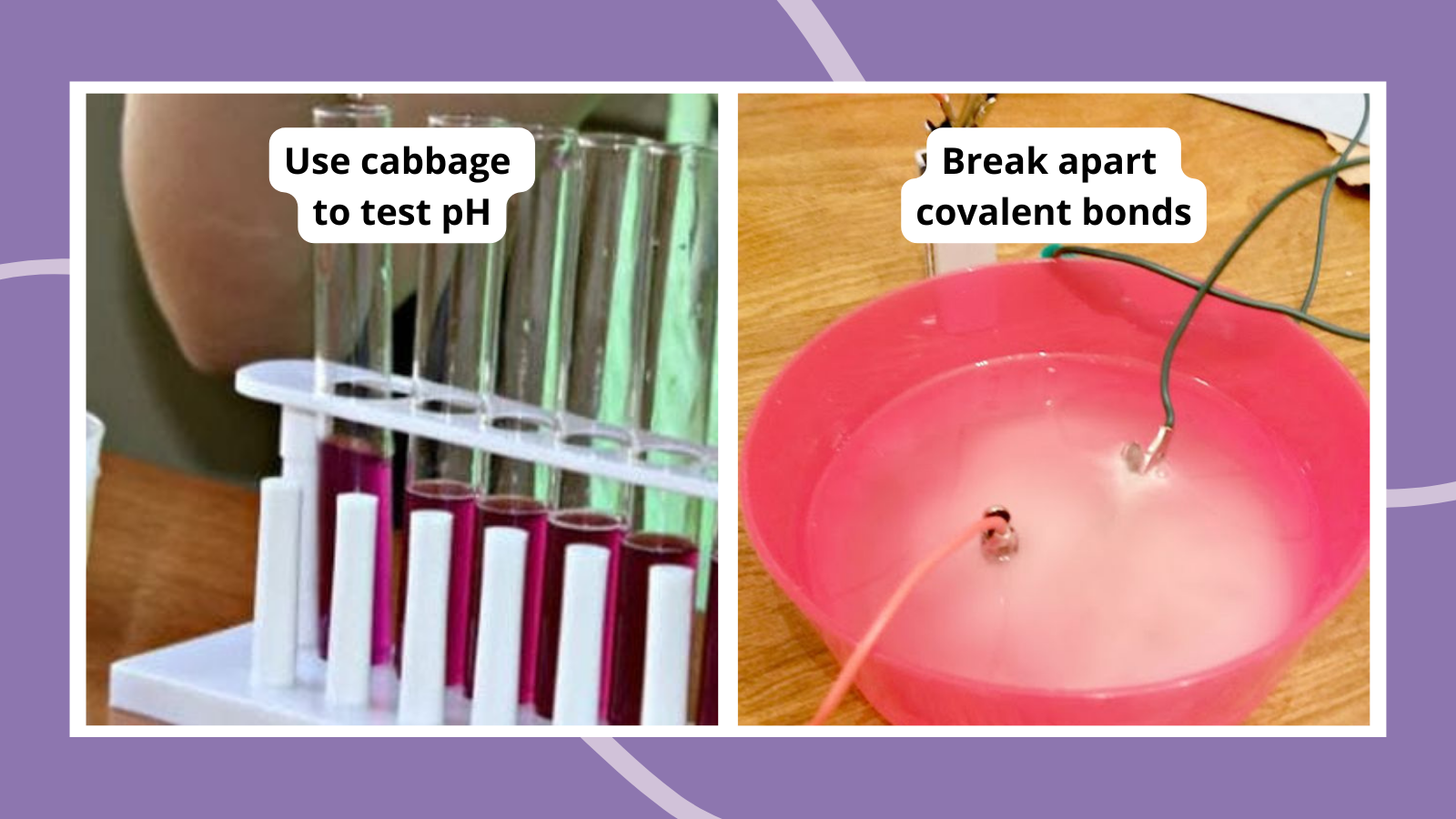
Bunsen burners, colorful chemicals, and the possibility of a (controlled) explosion or two? Everybody loves chemistry experiments! We’ve rounded up the best activities, demos, and chemistry science fair projects for kids and teens. Try them in the classroom or at home.
Easy Chemistry Experiments and Activities for All Ages
Chemistry science fair projects.
These chemistry experiments and activities are all easy to do using simple supplies you probably already have. Families can try them at home, or teachers and students can do them together in the classroom.
Mix up some magic milk
Kids love this colorful experiment, which explores the concept of surface tension. This is one of our favorite chemistry experiments to try at home, since the supplies are so basic and the results are so cool!
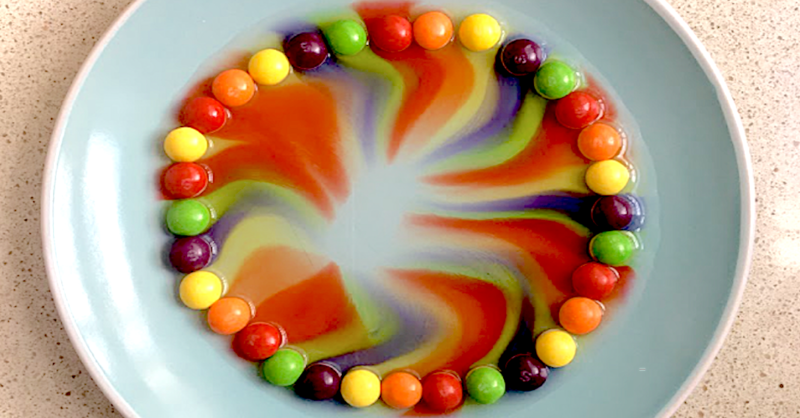
Taste the Rainbow
Teach your students about diffusion while creating a beautiful and tasty rainbow. You’ll definitely want to have extra Skittles on hand so your class can enjoy a few as well!
Learn more: Skittles Diffusion

Crystallize sweet treats
Crystal science experiments teach kids about supersaturated solutions. This one is easy to do at home, and the results are absolutely delicious!
Learn more: Candy Crystals
Make elephant-sized toothpaste
This fun project uses yeast and a hydrogen peroxide solution to create overflowing “elephant toothpaste.” You can also add an extra fun layer by having kids create toothpaste wrappers for their plastic bottles.

Blow the biggest bubbles you can
Add a few simple ingredients to dish soap solution to create the largest bubbles you’ve ever seen! Kids learn about surface tension as they engineer these bubble-blowing wands.
Learn more: Giant Soap Bubbles

Demonstrate the “magic” leakproof bag
So simple and so amazing! All you need is a zip-top plastic bag, sharp pencils, and some water to blow your kids’ minds. Once they’re suitably impressed, teach them how the “trick” works by explaining the chemistry of polymers.
Learn more: Leakproof Bag
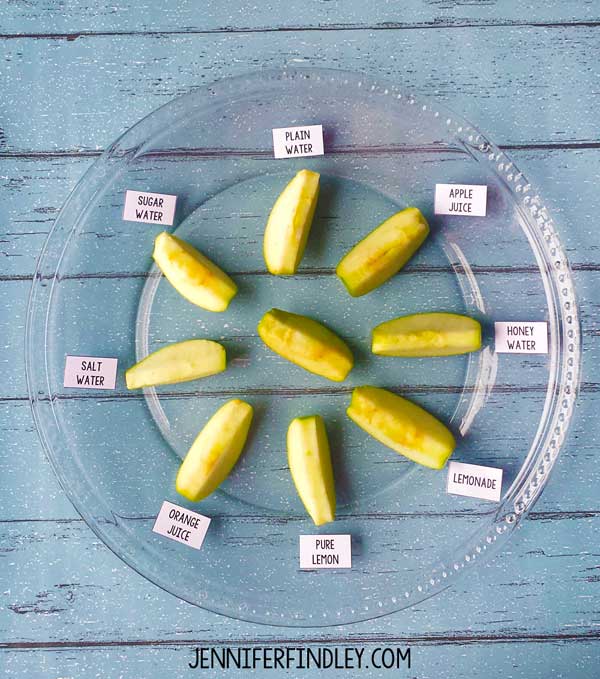
Use apple slices to learn about oxidation
Have students make predictions about what will happen to apple slices when immersed in different liquids, then put those predictions to the test! Finally, have them record their observations.
Learn more: Apple Oxidation
Float a marker man
Their eyes will pop out of their heads when you “levitate” a stick figure right off the table. This experiment works due to the insolubility of dry-erase marker ink in water, combined with the lighter density of the ink.
Learn more: Floating Marker Man

Discover density with hot and cold water
There are a lot of easy science experiments you can do with density. This one is extremely simple, involving only hot and cold water and food coloring, but the visuals make it appealing and fun.
Learn more: Layered Water
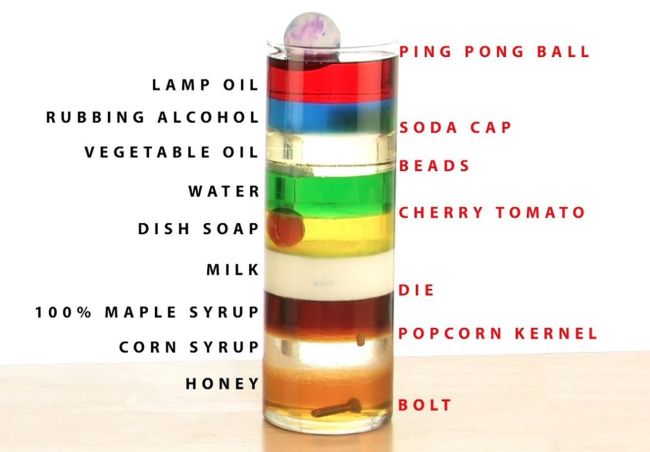
Layer more liquids
This density demo is a little more complicated, but the effects are spectacular. Slowly layer liquids like honey, dish soap, water, and rubbing alcohol in a glass. Kids will be amazed when the liquids float one on top of the other like magic (except it is really science).
Learn more: Layered Liquids
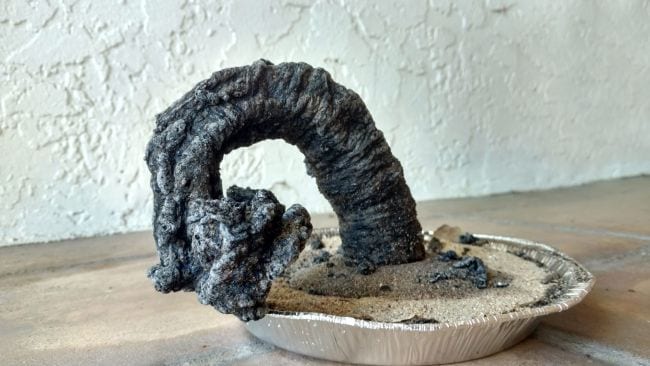
Grow a carbon sugar snake
Easy science experiments can still have impressive results. This eye-popping chemical reaction demonstration only requires simple supplies like sugar, baking soda, and sand.
Learn more: Carbon Sugar Snake
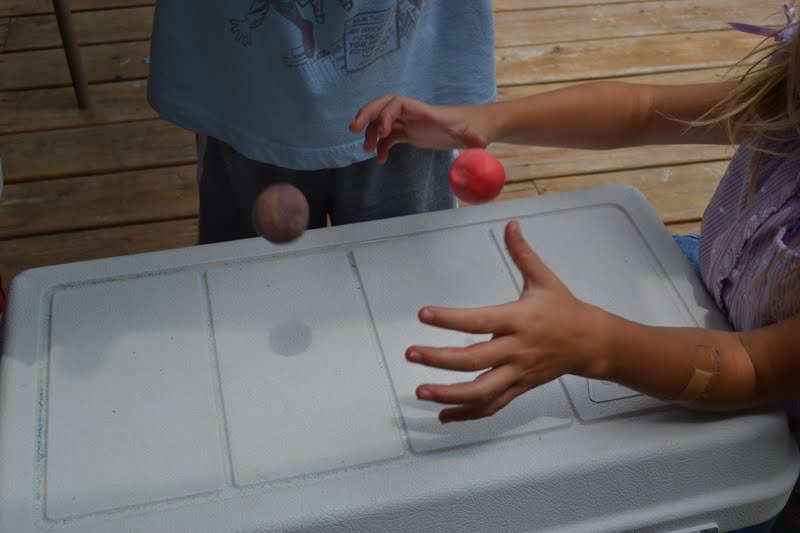
Make homemade bouncy balls
These homemade bouncy balls are easy to make since all you need is glue, food coloring, borax powder, cornstarch, and warm water. You’ll want to store them inside a container like a plastic egg because they will flatten out over time.
Learn more: Make Your Own Bouncy Balls

Create eggshell chalk
Eggshells contain calcium, the same material that makes chalk. Grind them up and mix them with flour, water, and food coloring to make your very own sidewalk chalk.
Learn more: Eggshell Chalk
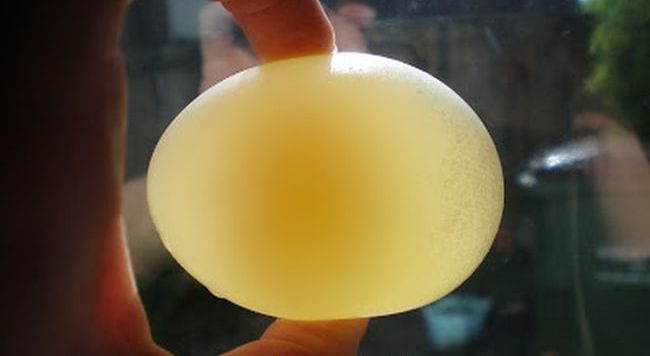
Make naked eggs
This is so cool! Use vinegar to dissolve the calcium carbonate in an eggshell to discover the membrane underneath that holds the egg together. Then, use the “naked” egg for another easy science experiment that demonstrates osmosis .
Learn more: Naked Egg Experiment
Turn milk into plastic
This sounds a lot more complicated than it is, but don’t be afraid to give it a try. Use simple kitchen supplies to create plastic polymers from plain old milk. Sculpt them into cool shapes when you’re done.
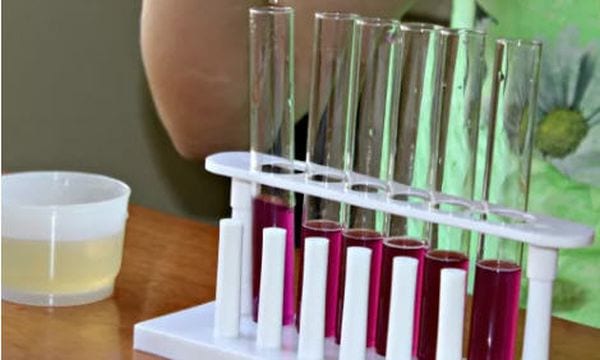
Test pH using cabbage
Teach kids about acids and bases without needing pH test strips. Simply boil some red cabbage and use the resulting water to test various substances—acids turn red and bases turn green.
Learn more: Cabbage pH
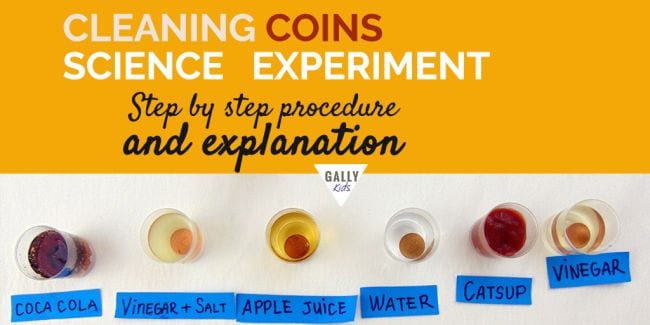
Clean some old coins
Use common household items to make old oxidized coins clean and shiny again in this simple chemistry experiment. Ask kids to predict (hypothesize) which will work best, then expand the learning by doing some research to explain the results.
Learn more: Cleaning Coins
Blow up a balloon (without blowing)
Chances are good you probably did easy science experiments like this when you were in school yourself. This well-known activity demonstrates the reactions between acids and bases. Fill a bottle with vinegar and a balloon with baking soda. Fit the balloon over the top, shake the baking soda down into the vinegar, and watch the balloon inflate.
Learn more: Balloon Experiments
Assemble a DIY lava lamp
This 1970s trend is back—as an easy science experiment! This activity combines acid/base reactions with density for a totally groovy result.
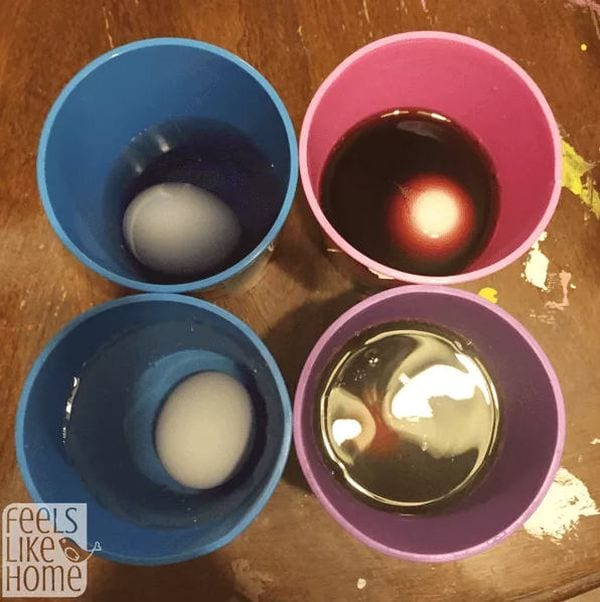
Explore how sugary drinks affect teeth
The calcium content of eggshells makes them a great stand-in for teeth. Use eggs to explore how soda and juice can stain teeth and wear down the enamel. Expand your learning by trying different toothpaste and toothbrush combinations to see how effective they are.
Learn more: Sugar and Teeth Experiment
Mummify a hot dog
If your kids are fascinated by the Egyptians, they’ll love learning to mummify a hot dog. No need for canopic jars ; just grab some baking soda and get started.
Extinguish flames with carbon dioxide
This is a fiery twist on acid-base experiments. Light a candle and talk about what fire needs in order to survive. Then, create an acid-base reaction and “pour” the carbon dioxide to extinguish the flame. The CO2 gas acts like a liquid, suffocating the fire.

Send secret messages with invisible ink
Turn your kids into secret agents! Write messages with a paintbrush dipped in lemon juice, then hold the paper over a heat source and watch the invisible become visible as oxidation goes to work.
Learn more: Invisible Ink
Set popcorn dancing
This is a fun version of the classic baking soda and vinegar experiment, perfect for the younger crowd. The bubbly mixture causes popcorn to dance around in the water.
Learn more: Dancing Popcorn Experiment
Shoot a soda geyser sky-high
You’ve always wondered if this really works, so it’s time to find out for yourself! Kids will marvel at the chemical reaction that sends diet soda shooting high in the air when Mentos are added.
Learn more: Mentos and Coke Experiment
All of these chemistry experiments are perfect for using the scientific method. Form a hypothesis, alter the variables, and then observe the results! You can simplify these projects for younger kids, or add more complexity for older students.
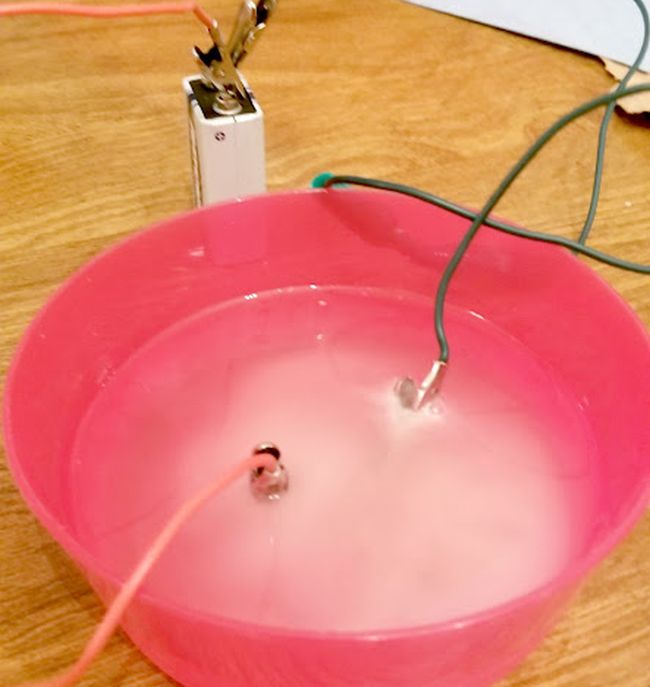
Break apart covalent bonds
Difficulty: Medium / Materials: Medium
Break the covalent bond of H 2 O into H and O with this simple experiment. You only need simple supplies for this one. Turn it into a science fair project by changing up the variables—does the temperature of the water matter? What happens if you try this with other liquids?
Learn more: Breaking Covalent Bonds
Measure the calories in various foods
Are the calorie counts on your favorite snacks accurate? Build your own calorimeter and find out! This kit from Home Science Tools has all the supplies you’ll need.
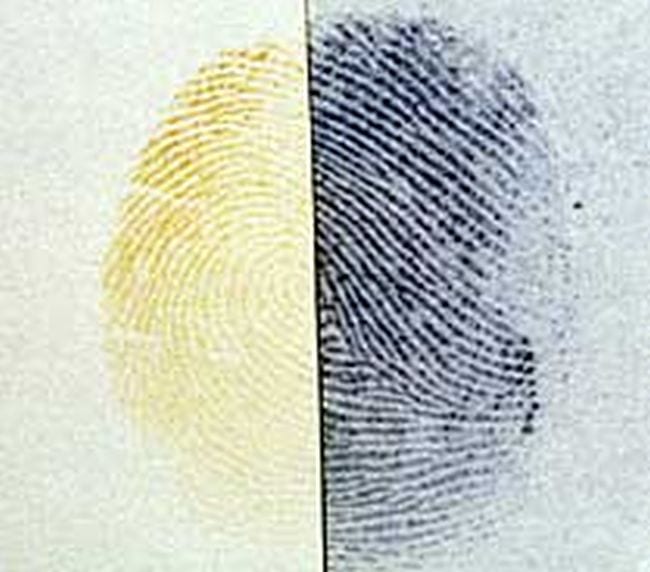
Detect latent fingerprints
Forensic science is engrossing and can lead to important career opportunities too. Explore the chemistry needed to detect latent (invisible) fingerprints, just like they do for crime scenes!
Learn more: Fingerprints Project
Use Alka-Seltzer to explore reaction rate
Difficulty: Easy / Materials: Easy
Tweak this basic concept to create a variety of high school chemistry science fair projects. Change the temperature, surface area, pressure, and more to see how reaction rates change.
Determine whether sports drinks really have more electrolytes than other beverages
Difficulty: Medium / Materials: Advanced
Are those pricey sports drinks really worth it? Try this experiment to find out. You’ll need some special equipment for this one; buy a complete kit at Home Science Tools .
Turn flames into a rainbow
You’ll need to get your hands on a few different chemicals for this experiment, but the wow factor will make it worth the effort. Make it a science project by seeing if different materials, air temperature, or other factors change the results.
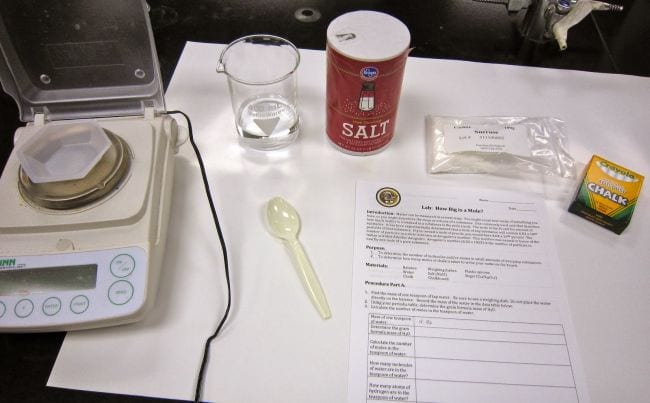
Discover the size of a mole
The mole is a key concept in chemistry, so it’s important to ensure students really understand it. This experiment uses simple materials like salt and chalk to make an abstract concept more concrete. Make it a project by applying the same procedure to a variety of substances, or determining whether outside variables have an effect on the results.
Learn more: How Big Is a Mole?
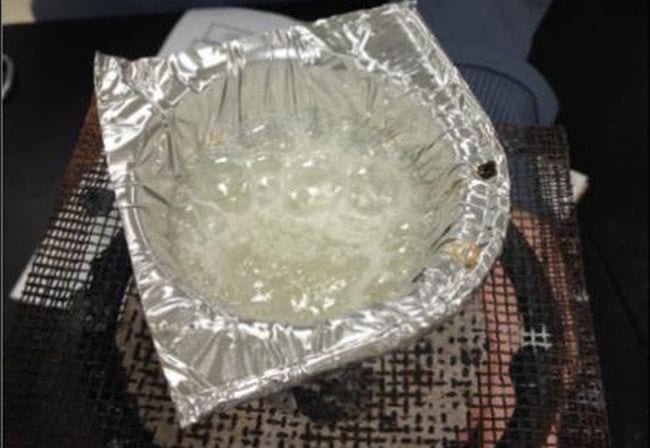
Cook up candy to learn mole and molecule calculations
This edible experiment lets students make their own peppermint hard candy while they calculate mass, moles, molecules, and formula weights. Tweak the formulas to create different types of candy and make this into a sweet science fair project!
Learn more: Candy Chemistry
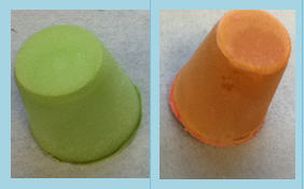
Make soap to understand saponification
Take a closer look at an everyday item: soap! Use oils and other ingredients to make your own soap, learning about esters and saponification. Tinker with the formula to find one that fits a particular set of parameters.
Learn more: Saponification
Uncover the secrets of evaporation
Explore the factors that affect evaporation, then come up with ways to slow them down or speed them up for a simple science fair project.
Learn more: Evaporation
More Chemistry Experiment Science Fair Ideas
These questions and prompts can spark ideas for unique chemistry experiments:
- Compare the properties of sugar and artificial sweeteners.
- Explore the impact of temperature, concentration, and seeding on crystal growth.
- Test various antacids on the market to find the most effective product.
- What is the optimum temperature for yeast production when baking bread from scratch?
- Compare the vitamin C content of various fruits and vegetables.
- How does temperature affect enzyme-catalyzed reactions?
- Investigate the effects of pH on an acid-base chemical reaction.
- Devise a new natural way to test pH levels (such as cabbage leaves).
- What’s the best way to slow down metal oxidation (the form of rust)?
- How do changes in ingredients and method affect the results of a baking recipe?
Like these chemistry experiments? Don’t miss STEM Activities for Kids of All Ages and Interests .
Plus, get all the latest teaching news and ideas when you sign up for our free newsletters.
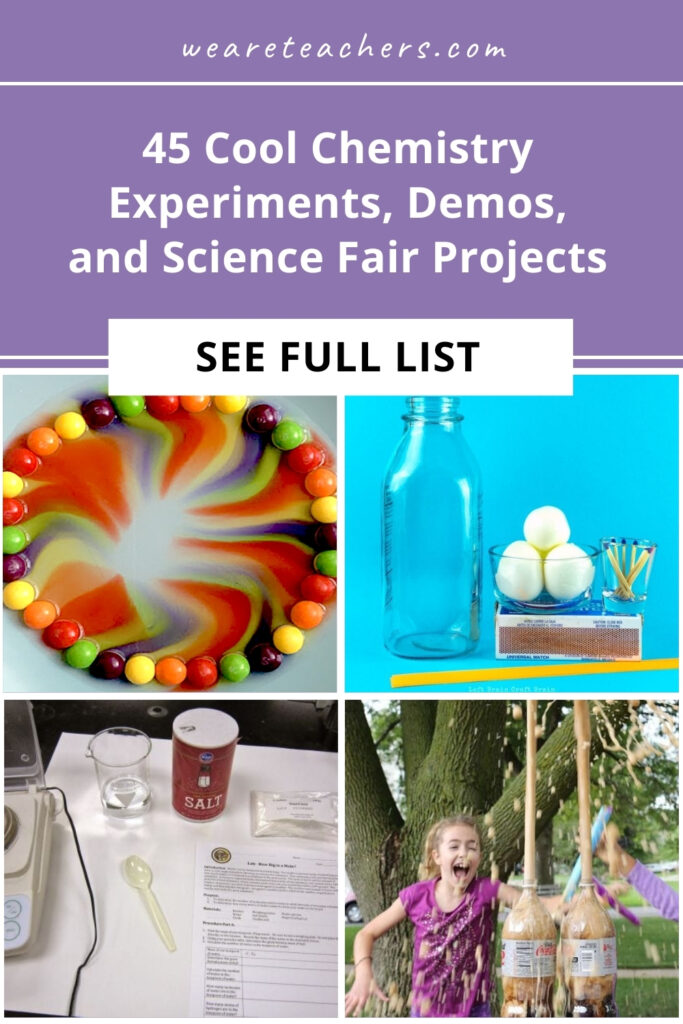
You Might Also Like
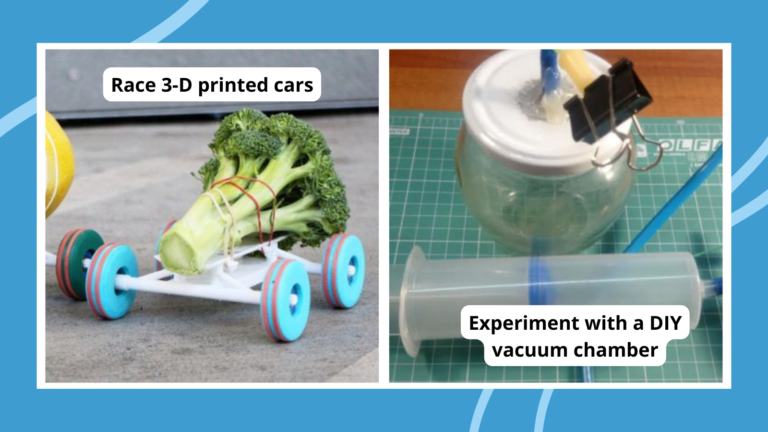
70 Best High School Science Fair Projects in Every Subject
Fire up the Bunsen burners! Continue Reading
Copyright © 2024. All rights reserved. 5335 Gate Parkway, Jacksonville, FL 32256
- Department of Chemistry
- Share on Facebook
- Share on Twitter
- Share on LinkedIn
- Share through Email
- Research News
ACS Project SEED Program – Bringing Research and High School Students Together
This summer, 17 high school students in the American Chemical Society Snake River Section will have the opportunity to conduct research through the ACS Project SEED program.
Project SEED, originally “Summer Experiences for the Economically Disadvantaged,” was born in 1968. Now 56 years old, the program has provided hands-on summer research experiences and webinars to over 13,000 students across the U.S. and its territories. The Project SEED Mission is “to provide sustained STEM research, learning, and growth opportunities for high school students with diverse identities and socioeconomic backgrounds so they can be empowered to advance and enrich the chemical science enterprise.”
Each year, high school students spend 10 weeks in an industry lab or at host institutions like Boise State University working alongside PIs and qualified mentors on cutting-edge research projects. In addition to the technical skills learned in the lab, students will participate in professional development activities to enhance skills in time management, teamwork, and research presentation. The Project SEED webinars cover topics such as personal and chemical safety, career exploration, college readiness, resume building, and mental health and wellness. The summer experience is culminated in a poster presentation where the student present their research, with this year’s presentations being held at the Idaho Conference on Undergraduate Research.
The ACS Snake River Section Project SEED coordinator is Boise State’s Dr. Don Warner, a professor in the Department of Chemistry and Biochemistry. This year he placed 17 students, 8 of whom are returning participants. He received 70 applications and conducted 24 initial interviews to fill the 9 open spots. Two students are going to Northwest Nazarene University to work with Jerry Harris on synthesizing and characterizing zinc oxide nanoparticles with enhanced antimicrobial properties. Two more will go to Danny Xu’s lab at Idaho State University – Meridian to research the effects of Lunar and Martian regolith on zebrafish.
The remaining 13 students will be working in several laboratories across campus at Boise State University this summer. The PIs hosting students, and their projects, are:
- Oliviero Andreussi: Computational Study of Materials for Electro-Catalysis
- Leonora Bittleston: 4: Exploring the effects of leaf chemistry on microbial colonization
- Eric Brown: Development of molecules that inhibit a bacteria’s ability to cause disease
- Ken Cornell: Analysis of Antimicrobial Activity of Nanoparticles and Organometallic Complexes
- Jenée Cyran & Brian McClain: Developing innovative Physical Chemistry Lab Modules
- Owen McDougal: Chemistry of Food Systems
- Konrad Meister: Cool Molecules: Understanding the Mode of Action of Ice-Binding Macromolecules
- Don Warner: Synthesis of small molecules for inhibition of tumor metastasis
- Claire Xiong: Sodium Ion Batteries
Participants in the Project SEED program are awarded a stipend for their efforts, providing low-income students the opportunity to participate while earning money to help support their families. This crucial funding in 2024 is largely from the American Chemical Society, but also contributed to by Northwest Nazarene University, the ACS Snake River Local Section, and from Boise State University’s College of Arts & Sciences, Research and Economic Development, Materials Science and Engineering, Chemistry & Biochemistry, several individual PIs, and the university itself. Some of the program’s graduates will also receive scholarships from Project SEED to help fund their undergraduate education.
For more information on this amazing program, visit ACS News to read Project SEED’s Impact Continues to Grow .
Interested in getting involved? Visit Project SEED on the American Chemical Society’s webpage.
Department of Chemistry and Biochemistry

'Each subset of chemistry is fascinating and intriguing in its own way'
5/17/2024 A&S Communications
Julian Morales
Chemistry and Chemical Biology Hackensack, N.J.
What was your favorite class and why?
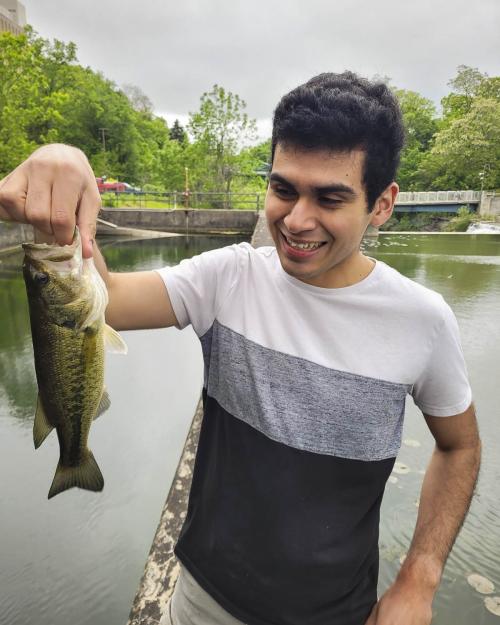
Contrary to popular belief, the chemistry lab courses on the honors track have been my favorite and most enjoyable classes by far. With a strong focus on common practical applications of chemistry techniques, I’ve found that, from organic synthesis to analytical experimentation, each subset of chemistry is fascinating and intriguing in its own way. For each lab, it’s like following a well-made recipe from a cookbook, except the cookbook says to use some corrosive or toxic ingredients with caution.
What is your main extracurricular activity and why is it important to you?
My time as a cadet in the Cornell Army ROTC program has been demanding, but extremely worthwhile. The unique challenges and change of pace from standard academic life create an extremely tight-knit community that I’m proud to be a part of, introducing me to my closest friends and best mentors. I’ve learned to hone my leadership abilities, develop critical problem-solving skills and become resilient through some of the hardest challenges I’ve faced. From carrying more than 50 pounds of equipment for miles in freezing temperatures to intensively planning program-wide training events, I’ve realized the importance of developing and improving your own leadership style to communicate effectively with others and accomplish a well-defined goal.

What have you accomplished as a Cornell student that you are most proud of?
My research with both the Hyster Group and the Chang Group in the chemistry department has been most important in my development as a scientist. The Hyster Group introduced me to the world of photoenzymatic catalysis for new synthetic methods, while the Chang Group has shown me new chemoproteomic ways of identifying enzymes in the human gut. Each group demonstrates that the world of chemistry is massive and ever evolving, with much of the work requiring an interdisciplinary skillset from other physical and life sciences. This skillset doesn’t come in the form of one researcher, but rather multiple individuals working together as a team. As an undergraduate researcher, I have found that I am still able to make worthy contributions to further chemical research, while absorbing as much information as I can to prepare myself for later graduate studies.
Who or what influenced your Cornell education the most?
The close friends that I’ve made at Cornell have been most influential in my education, as they have provided the main support that’s allowed me to enjoy my time here with a busy schedule. These few come from all sorts of different schools at Cornell: Arts & Sciences, CALS, Dyson, ILR to name a few. Regardless, they’ve all been the best friends I could have ever asked for, showing me that you also need to be happy to be healthy and successful in your daily life.

What are your plans for next year?
I will be attending graduate school at UCLA to earn my PhD in organic chemistry and continue my scientific journey. It'll be my first time ever going to the West Coast, so I'm certain it'll be a captivating experience. As well, I will begin my first assignment as a newly commissioned U.S. Army transportation officer in Los Angeles.
Every year, our faculty nominate graduating Arts & Sciences students to be featured as part of our Extraordinary Journeys series. Read more about the Class of 202 4.

Chemistry Senior Recognized as 2024 Merrill Presidential Scholar

'Science has a wide community and you can always find people to help'
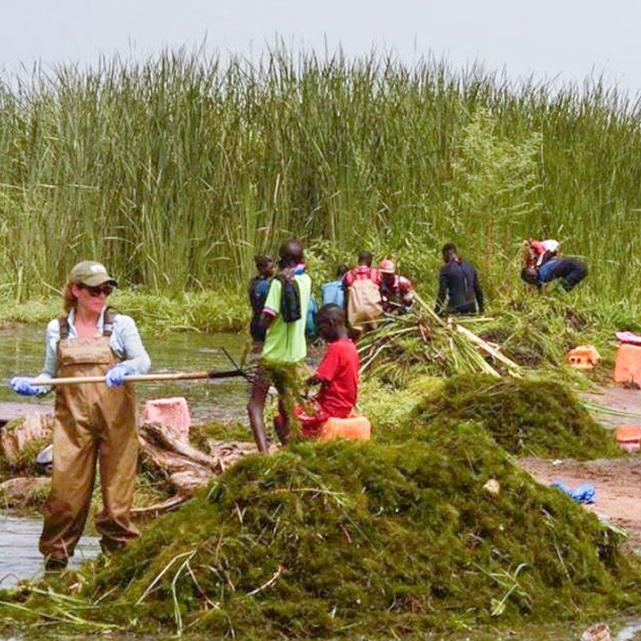
Dead & Company concert funds $800K for new climate solutions

Four Cornell professors elected to national academy

'Each subset of chemistry is fascinating and intriguing in its own way'
Julian Morales: Chemistry and Chemical Biology
A&S Communications
Julian Morales
Chemistry and Chemical Biology Hackensack, N.J.
What was your favorite class and why?

Contrary to popular belief, the chemistry lab courses on the honors track have been my favorite and most enjoyable classes by far. With a strong focus on common practical applications of chemistry techniques, I’ve found that, from organic synthesis to analytical experimentation, each subset of chemistry is fascinating and intriguing in its own way. For each lab, it’s like following a well-made recipe from a cookbook, except the cookbook says to use some corrosive or toxic ingredients with caution.
What is your main extracurricular activity and why is it important to you?
My time as a cadet in the Cornell Army ROTC program has been demanding, but extremely worthwhile. The unique challenges and change of pace from standard academic life create an extremely tight-knit community that I’m proud to be a part of, introducing me to my closest friends and best mentors. I’ve learned to hone my leadership abilities, develop critical problem-solving skills and become resilient through some of the hardest challenges I’ve faced. From carrying more than 50 pounds of equipment for miles in freezing temperatures to intensively planning program-wide training events, I’ve realized the importance of developing and improving your own leadership style to communicate effectively with others and accomplish a well-defined goal.

What have you accomplished as a Cornell student that you are most proud of?
My research with both the Hyster Group and the Chang Group in the chemistry department has been most important in my development as a scientist. The Hyster Group introduced me to the world of photoenzymatic catalysis for new synthetic methods, while the Chang Group has shown me new chemoproteomic ways of identifying enzymes in the human gut. Each group demonstrates that the world of chemistry is massive and ever evolving, with much of the work requiring an interdisciplinary skillset from other physical and life sciences. This skillset doesn’t come in the form of one researcher, but rather multiple individuals working together as a team. As an undergraduate researcher, I have found that I am still able to make worthy contributions to further chemical research, while absorbing as much information as I can to prepare myself for later graduate studies.
Who or what influenced your Cornell education the most?
The close friends that I’ve made at Cornell have been most influential in my education, as they have provided the main support that’s allowed me to enjoy my time here with a busy schedule. These few come from all sorts of different schools at Cornell: Arts & Sciences, CALS, Dyson, ILR to name a few. Regardless, they’ve all been the best friends I could have ever asked for, showing me that you also need to be happy to be healthy and successful in your daily life.

What are your plans for next year?
I will be attending graduate school at UCLA to earn my Ph.D. in organic chemistry and continue my scientific journey. It'll be my first time ever going to the West Coast, so I'm certain it'll be a captivating experience. As well, I will begin my first assignment as a newly commissioned U.S. Army transportation officer in Los Angeles.
Every year, our faculty nominate graduating Arts & Sciences students to be featured as part of our Extraordinary Journeys series. Read more about the Class of 202 4.
More News from A&S
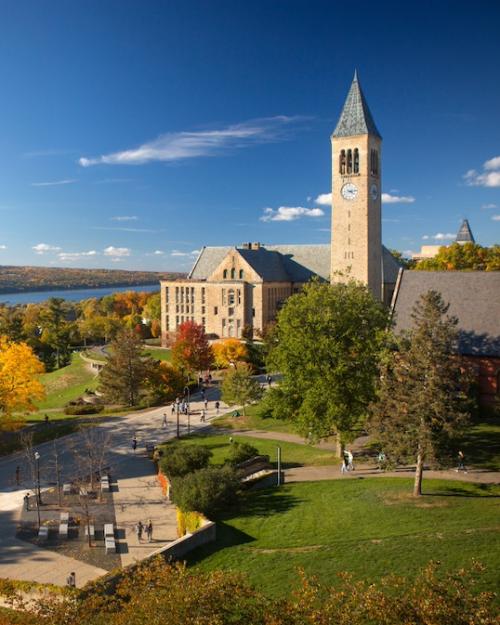
Committee to recommend final expressive activity policy

American Sign Language has found a growing home on the Hill

Extraordinary Journeys: The Class of 2024

BTPI will research relationship between Bitcoin and financial freedom

Students & Educators —Menu
- Educational Resources
- Educators & Faculty
- College Planning
- ACS ChemClub
- Project SEED
- U.S. National Chemistry Olympiad
- Student Chapters
- ACS Meeting Information
- Undergraduate Research
- Internships, Summer Jobs & Coops
- Study Abroad Programs
- Finding a Mentor
- Two Year/Community College Students
- Social Distancing Socials
Planning for Graduate School
- Grants & Fellowships
- Career Planning
- International Students
- Planning for Graduate Work in Chemistry
- ACS Bridge Project
- Graduate Student Organizations (GSOs)
- Schedule-at-a-Glance
- Standards & Guidelines
- Explore Chemistry
- Science Outreach
- Publications
- ACS Student Communities
- You are here:
- American Chemical Society
- Students & Educators
- Undergraduate
- Undergraduate Research Guide
Undergraduate Research in Chemistry Guide
Research is the pursuit of new knowledge through the process of discovery. Scientific research involves diligent inquiry and systematic observation of phenomena. Most scientific research projects involve experimentation, often requiring testing the effect of changing conditions on the results. The conditions under which specific observations are made must be carefully controlled, and records must be meticulously maintained. This ensures that observations and results can be are reproduced. Scientific research can be basic (fundamental) or applied. What is the difference? The National Science Foundation uses the following definitions in its resource surveys:
- Basic research The objective of basic research is to gain more comprehensive knowledge or understanding of the subject under study, without specific applications in mind. In industry, basic research is defined as research that advances scientific knowledge but does not have specific immediate commercial objectives, although it may be in fields of present or potential commercial interest.
- Applied research Applied research is aimed at gaining knowledge or understanding to determine the means by which a specific, recognized need may be met. In industry, applied research includes investigations oriented to discovering new scientific knowledge that has specific commercial objectives with respect to products, processes, or services.

Get on the path to graduate school with our comprehensive guide to selecting an institution and preparing for graduate studies.
What is research at the undergraduate level?
At the undergraduate level, research is self-directed work under the guidance and supervision of a mentor/advisor ― usually a university professor. A gradual transition towards independence is encouraged as a student gains confidence and is able to work with minor supervision. Students normally participate in an ongoing research project and investigate phenomena of interest to them and their advisor. In the chemical sciences, the range of research areas is quite broad. A few groups maintain their research area within a single classical field of analytical, inorganic, organic, physical, chemical education or theoretical chemistry. More commonly, research groups today are interdisciplinary, crossing boundaries across fields and across other disciplines, such as physics, biology, materials science, engineering and medicine.
What are the benefits of being involved in undergraduate research?
There are many benefits to undergraduate research, but the most important are:
- Learning, learning, learning. Most chemists learn by working in a laboratory setting. Information learned in the classroom is more clearly understood and it is more easily remembered once it has been put into practice. This knowledge expands through experience and further reading. From the learning standpoint, research is an extremely productive cycle.
- Experiencing chemistry in a real world setting. The equipment, instrumentation and materials used in research labs are generally more sophisticated, advanced, and of far better quality than those used in lab courses
- Getting the excitement of discovery. If science is truly your vocation, regardless of any negative results, the moment of discovery will be truly exhilarating. Your results are exclusive. No one has ever seen them before.
- Preparing for graduate school. A graduate degree in a chemistry-related science is mostly a research degree. Undergraduate research will not only give you an excellent foundation, but working alongside graduate students and post-doctorates will provide you with a unique opportunity to learn what it will be like.
Is undergraduate research required for graduation?
Many chemistry programs now require undergraduate research for graduation. There are plenty of opportunities for undergraduate students to get involved in research, either during the academic year, summer, or both. If your home institution is not research intensive, you may find opportunities at other institutions, government labs, and industries.
What will I learn by participating in an undergraduate research program?
Conducting a research project involves a series of steps that start at the inquiry level and end in a report. In the process, you learn to:
- Conduct scientific literature searches
- Read, interpret and extract information from journal articles relevant to the project
- Design experimental procedures to obtain data and/or products of interest
- Operate instruments and implement laboratory techniques not usually available in laboratories associated with course work
- Interpret results, reach conclusions, and generate new ideas based on results
- Interact professionally (and socially) with students and professors within the research group, department and school as well as others from different schools, countries, cultures and backgrounds
- Communicate results orally and in writing to other peers, mentors, faculty advisors, and members of the scientific community at large via the following informal group meeting presentations, reports to mentor/advisor, poster presentations at college-wide, regional, national or international meetings; formal oral presentations at scientific meetings; or journal articles prepared for publication
When should I get involved in undergraduate research?
Chemistry is an experimental science. We recommended that you get involved in research as early in your college life as possible. Ample undergraduate research experience gives you an edge in the eyes of potential employers and graduate programs.
While most mentors prefer to accept students in their research labs once they have developed some basic lab skills through general and organic lab courses, some institutions have programs that involve students in research projects the summer prior to their freshman year. Others even involve senior high school students in summer research programs. Ask your academic/departmental advisor about the options available to you.
How much time should I allocate to research?
The quick answer is as much as possible without jeopardizing your course work. The rule of thumb is to spend 3 to 4 hours working in the lab for every credit hour in which you enroll. However, depending on the project, some progress can be achieved in just 3-4 hours of research/week. Most advisors would recommend 8-10 hours/week.
Depending on your project, a few of those hours may be of intense work and the rest may be spent simply monitoring the progress of a reaction or an instrumental analysis. Many research groups work on weekends. Saturdays are excellent days for long, uninterrupted periods of lab work.
How do I select an advisor?
This is probably the most important step in getting involved in undergraduate research. The best approach is multifaceted. Get informed about research areas and projects available in your department, which are usually posted on your departmental website under each professor’s name.
Talk to other students who are already involved in research. If your school has an ACS Student Chapter , make a point to talk to the chapter’s members. Ask your current chemistry professor and lab instructor for advice. They can usually guide you in the right direction. If a particular research area catches your interest, make an appointment with the corresponding professor.
Let the professor know that you are considering getting involved in research, you have read a bit about her/his research program, and that you would like to find out more. Professors understand that students are not experts in the field, and they will explain their research at a level that you will be able to follow. Here are some recommended questions to ask when you meet with this advisor:
- Is there a project(s) within her/his research program suitable for an undergraduate student?
- Does she/he have a position/space in the lab for you?
- If you were to work in her/his lab, would you be supervised directly by her/him or by a graduate student? If it is a graduate student, make a point of meeting with the student and other members of the research group. Determine if their schedule matches yours. A night owl may not be able to work effectively with a morning person.
- Does she/he have funding to support the project? Unfunded projects may indicate that there may not be enough resources in the lab to carry out the project to completion. It may also be an indication that funding agencies/peers do not consider this work sufficiently important enough for funding support. Of course there are exceptions. For example, a newly hired assistant professor may not have external funding yet, but he/she may have received “start-up funds” from the university and certainly has the vote of confidence of the rest of the faculty. Otherwise he/she would not have been hired. Another classical exception is computational chemistry research, for which mostly fast computers are necessary and therefore external funding is needed to support research assistants and computer equipment only. No chemicals, glassware, or instrumentation will be found in a computational chemistry lab.
- How many of his/her articles got published in the last two or three years? When prior work has been published, it is a good indicator that the research is considered worthwhile by the scientific community that reviews articles for publication. Ask for printed references. Number of publications in reputable refereed journals (for example ACS journals) is an excellent indicator of the reputation of the researcher and the quality of his/her work.
Here is one last piece of advice: If the project really excites you and you get satisfactory answers to all your questions, make sure that you and the advisor will get along and that you will enjoy working with him/her and other members of the research group.
Remember that this advisor may be writing recommendation letters on your behalf to future employers, graduate schools, etc., so you want to leave a good impression. To do this, you should understand that the research must move forward and that if you become part of a research team, you should do your best to achieve this goal. At the same time, your advisor should understand your obligations to your course work and provide you with a degree of flexibility.
Ultimately, it is your responsibility to do your best on both course work and research. Make sure that the advisor is committed to supervising you as much as you are committed to doing the required work and putting in the necessary/agreed upon hours.
What are some potential challenges?
- Time management . Each project is unique, and it will be up to you and your supervisor to decide when to be in the lab and how to best utilize the time available to move the project forward.
- Different approaches and styles . Not everyone is as clean and respectful of the equipment of others as you are. Not everyone is as punctual as you are. Not everyone follows safety procedures as diligently as you do. Some groups have established protocols for keeping the lab and equipment clean, for borrowing equipment from other members, for handling common equipment, for research meetings, for specific safety procedures, etc. Part of learning to work in a team is to avoid unnecessary conflict while establishing your ground to doing your work efficiently.
- “The project does not work.” This is a statement that advisors commonly hear from students. Although projects are generally very well conceived, and it is people that make projects work, the nature of research is such that it requires patience, perseverance, critical thinking, and on many occasions, a change in direction. Thoroughness, attention to detail, and comprehensive notes are crucial when reporting the progress of a project.
Be informed, attentive, analytical, and objective. Read all the background information. Read user manuals for instruments and equipment. In many instances the reason for failure may be related to dirty equipment, contaminated reagents, improperly set instruments, poorly chosen conditions, lack of thoroughness, and/or lack of resourcefulness. Repeating a procedure while changing one parameter may work sometimes, while repeating the procedure multiple times without systematic changes and observations probably will not.
When reporting failures or problems, make sure that you have all details at hand. Be thorough in you assessment. Then ask questions. Advisors usually have sufficient experience to detect errors in procedures and are able to lead you in the right direction when the student is able to provide all the necessary details. They also have enough experience to know when to change directions. Many times one result may be unexpected, but it may be interesting enough to lead the investigation into a totally different avenue. Communicate with your advisor/mentor often.
Are there places other than my institution where I can conduct research?
Absolutely! Your school may be close to other universities, government labs and/or industries that offer part-time research opportunities during the academic year. There may also be summer opportunities in these institutions as well as in REU sites (see next question).
Contact your chemistry department advisor first. He/she may have some information readily available for you. You can also contact nearby universities, local industries and government labs directly or through the career center at your school. You can also find listings through ACS resources:
- Research Opportunities (US only)
- International Research Opportunities
- Internships and Summer Jobs
What are Research Experiences for Undergraduates (REU) sites? When should I apply for a position in one of them?
REU is a program established by the National Science Foundation (NSF) to support active research participation by undergraduate students at host institutions in the United States or abroad. An REU site may offer projects within a single department/discipline or it may have projects that are inter-departmental and interdisciplinary. There are currently over 70 domestic and approximately 5 international REU sites with a chemistry theme. Sites consist of 10-12 students each, although there are larger sites that supplement NSF funding with other sources. Students receive stipends and, in most cases, assistance with housing and travel.
Most REU sites invite rising juniors and rising seniors to participate in research during the summer. Experience in research is not required to apply, except for international sites where at least one semester or summer of prior research experience is recommended. Applications usually open around November or December for participation during the following summer. Undergraduate students supported with NSF funds must be citizens or permanent residents of the United States or its possessions. Some REU sites with supplementary funds from other sources may accept international students that are enrolled at US institutions.
- Get more information about REU sites
How do I prepare a scientific research poster?
Here are some links to sites with very useful information and samples.
- How to Prepare a Proper Scientific Paper or Poster
- Creating Effective Poster Presentations
- Designing Effective Poster Presentations
Research and Internship Opportunities
- Internships and Fellowships Find internships, fellowships, and cooperative education opportunities.
- SCI Scholars Internship Program Industrial internships for chemistry and chemical engineering undergraduates.
- ACS International Center Fellowships, scholarships, and research opportunities around the globe
Accept & Close The ACS takes your privacy seriously as it relates to cookies. We use cookies to remember users, better understand ways to serve them, improve our value proposition, and optimize their experience. Learn more about managing your cookies at Cookies Policy .
1155 Sixteenth Street, NW, Washington, DC 20036, USA | service@acs.org | 1-800-333-9511 (US and Canada) | 614-447-3776 (outside North America)
- Terms of Use
- Accessibility
Copyright © 2024 American Chemical Society
- MyU : For Students, Faculty, and Staff
hUMNs of Chemistry #15
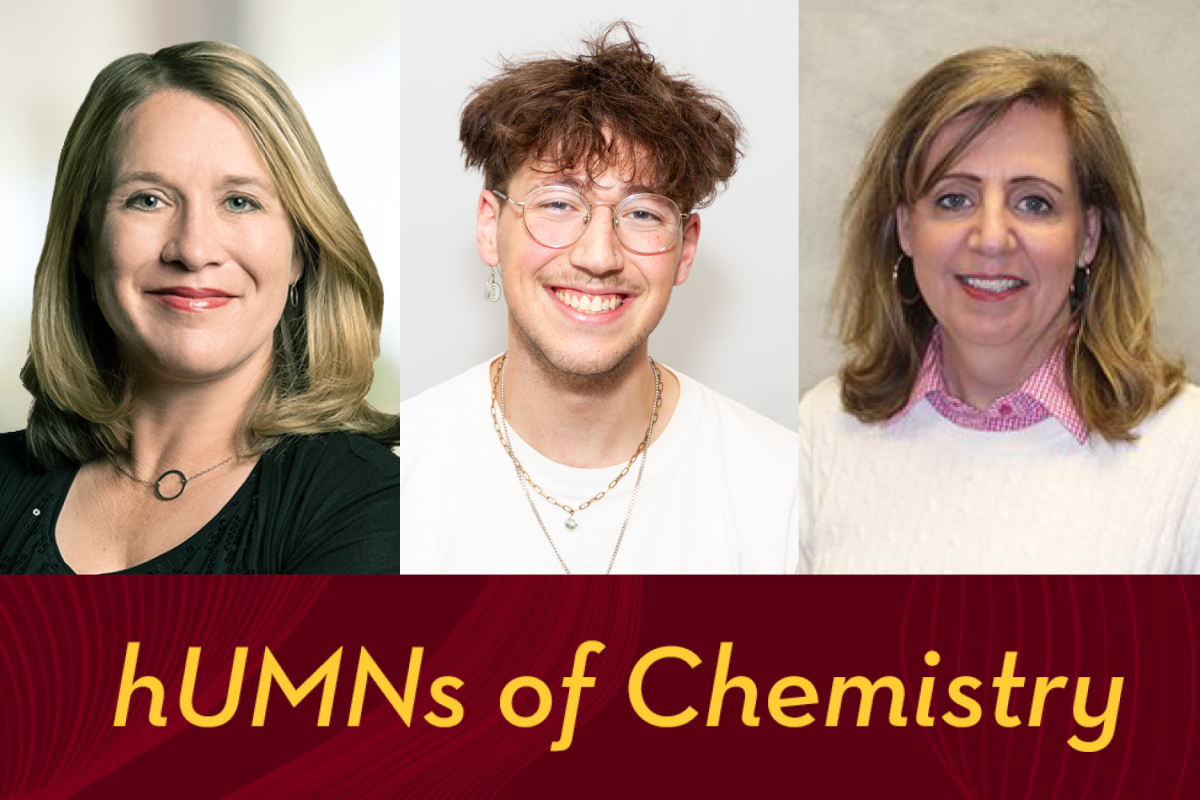
Christy Haynes
She/her Department Head and Distinguished McKnight University Professor
Tell us about your journey to the University of Minnesota.
I was hired as an assistant professor before I finished my PhD (I could hardly believe it!), did a brief post-doc, and then arrived to launch my research group in Summer 2005. While I was born and raised in Arizona, I had gone to college in St. Paul, so I already knew that I liked the Twin Cities as a place to live.
We would love to hear more about your research! What do you hope to accomplish with this work? What is the real-world impact for the average person?
My research group most often explores challenging analytical or nanomaterials projects in applied areas like sensing, agriculture, biology, or medicine. Our research goal is develop new materials and methods to take on important challenges like sensing pathogenic bacteria, remediating PFAS pollution, and improve agriculture yields.
What courses do you teach? What can students expect to get out of your course?
Right now, I'm not teaching anything because being Department Head is a time-consuming job. I've enjoyed teaching general chemistry, graduate-level analytical spectroscopy, and freshman seminars (one about science in dystopian literature and another about designing TED talks).
What do you hope to contribute to the chemistry community at the University?
Great science done by great people! As a large, urban public university in a department that serves so many people, we have a great opportunity to promote detailed technical education and research while combatting anti-science sentiments among the voting public.
When you visit other universities, what do you love to share about our UMN community?
I love to talk about the amazing community that we share, the high level of collaboration and multidisciplinarity, the student leadership, and all of the great things about living in the Twin Cities.
Tell us about an important mentor in your academic life?
My PhD advisor, Rick Van Duyne, was an important academic mentor. He treated me like a partner in my graduate research, making it possible for me to present in high-profile venues, write proposals, and mentor junior researchers. He had faith in my potential long before (and much more unconditionally than) I did. Rick was a real scientific visionary - always full of big ideas and not intimidated by technical challenges. Unfortunately, he passed away in 2019; I wish my current group members had the opportunity to know him.
Tell us about an important mentee in your academic life?
Goodness, that is a difficult question to answer because there are so many. I feel like you could ask me this question about any generation of my research group, and I'd have a compelling answer. For the sake of brevity, I'll pick just one: Becky Rodriguez. Becky was in my group from 2016-2021, and she did some impressive work developing sensors for toxins. What influenced me even more than Becky's science was her resilience and her clear focus on why (and for who) she was doing her PhD. Becky was also tireless in her advocacy for others and invested in her doctoral work with her whole heart.
What do you do outside of the classroom/lab/office for fun?
I'm an engaged parent to two busy kids, I like to travel, and I can often be found jogging or walking the lakes in Southwest Minneapolis.
What’s your favorite piece of chemistry/science pop culture media? Why do you love it?
I'm a big Kurt Vonnegut fan, so, even though it brings about the end of the world, I have to say "ice-nine."
What was your very first job?
Beyond babysitting, I was a bank teller from the time I was 16-19.
Where is your favorite spot in the Twin Cities?
The Lake Harriet walking trail
Tell us about who makes up your household (including pets).
My spouse and I have two kids, a 12-year-old and a 16-year-old, and we have an unintentional rescue dog named Gia.
Are there any family or cultural traditions you want to share with our community?
My family always played a lot of board games and cards. I would love to have a regular card club to play euchre, sheepshead, and samba.
What non-chemistry interest or activity might surprise department members?
Not sure if it would surprise people or not, but I have a thing for TED and TED talks. I've been to several of the events in person (amazing!) and even rented a hotel room in the Twin Cities once for several days to watch the live stream uninterrupted. I enjoy deconstructing the talks I love most to figure out how and why they grab me and inspire me.

Parker Staub
He/Him/His or They/Them/Theirs 2nd Year Graduate Student
Tell us about your journey to the University of Minnesota.
Before living here, I grew up in a small Civil War town in Pennsylvania called Gettysburg and spent my entire childhood there. Gettysburg is supposed to be one of the most haunted places in the United States (because there was that one really big 3 day battle there like 200 years ago), but I never saw any ghosts or anything, which was disappointing :( From there, I moved west to attend the University of Pittsburgh, where I initially intended to work towards becoming a physical therapist. I quickly realized that I really didn't love the patient care field and then took organic chemistry, which was one of the best decisions of my life! I fell in love with chemistry, switched my major, and began working in the lab of Professor Yiming Wang. I studied the allylic C-H functionalization of simple alkenes and had a blast (and got published! Here's the DOI: https://doi.org/10.1002/anie.202216309.) Special shoutout to Yiming and my graduate student mentor Ruihan for being so supportive and helping foster my passion for chemistry.
We would love to hear more about your research interests! What do you hope to accomplish with this work? What is the real-world impact for the average person?
Broadly speaking, I work in the field of asymmetric catalysis for the synthesis of organic compounds. A good analogy for the importance of asymmetric catalysis in my opinion (and many others) is to think about hands. Imagine you need to shake someone's hand to seem all professional and stuff, and the person reaches out with their right hand. Unless you're feeling real silly and goofy, you'd want to also use your right hand to shake their hand since they fit together really well. Chemicals also have "handedness" and this is super important when thinking about designing medications to interact with specific parts of your body. Receptors can have parts of them that are either right or left handed, and if you put a left handed molecule in to bind with a right handed receptor, what you want to happen won't (and maybe something awful will happen, like with an old medication called thalidomide. Google at your own risk).
To be more specific, I am developing chiral (or "handed") organocatalysts that can reversibly bind with chemicals through existing groups in them, and mediate metal catalyzed reactions. The organocatalysts are called transient directing groups. This is really important because oftentimes in order for metal catalyzed reactions to occur, something irreversibly bound to the chemical compound is required to mediate such processes efficiently, which limits the scope of these reactions. In simpler terms, you can't make certain compounds because they need something stuck on them. Transient directing groups aren't stuck on your molecule after the reaction. Research is going good right now too so stay tuned for a publication (hopefully) in the near future to learn some more!
Are you involved in any student groups? What inspired you to get involved?
Last year I was involved with the DEI committee and was a part of the community building working group! I am super passionate about equity in science and making people feel welcome in general. I love connecting with others and making people from everywhere feel safe. I think being able to talk and work with people from across the world is a beautiful thing and makes us better (science agrees with me so I'm right). I'm hoping to be more involved with DEI initiatives in the future; I got a little busy during preliminary exam season.
What advice do you have for incoming chemistry students?
I'm going to try to keep this short and simple: 1. Make sure you love chemistry. Definitely will need this to get through the harder times of graduate school. 2. Find someone (or many people) to work for/with who makes you feel supported, motivated, and seen. Again, the harder times of graduate school are much easier with this. 3. Find something else to do outside of chemistry! Burnout is real and spooky, go touch grass or be a nerd about something else.
My current advisor, Professor Chris Douglas (I just call him Chris FYI) has been a phenomenal PI in my first two years of graduate school. I struggle with anxiety and depression which can be exacerbated in STEM fields since failure is a regular experience. Chris has made me feel extremely safe and empowered to try things and has supported me in reframing failure. We work together on difficult problems that arise during research, and I feel respected, competent, and most importantly, not alone. I can talk with him about my anxieties and concerns and know that I will be supported and understood. Additionally, I appreciate that I don't have to hide my queerness at work or in front of Chris, which is always a small fear in the back of my head. I can't thank Chris enough for letting me work in his group :)
What are your plans after graduation?
I am leaning towards working at a Primarily Undergraduate Institution (PUI) as a professor! I've had a lot of fun teaching (I love people, I know I said that before but I'll say it again) and I think I'm pretty good at it too. I also like that I can do research at the same time with maybe a little less stress than in an R1 setting. I would also enjoy moving to Europe for a postdoc before launching a more "permanent" career.
I hope that I can be seen as a friendly person to say hi to, or to help make others feel comfortable. I also want to be a mentor for younger graduate students to ask advice from. I've received great advice and support from a number of older graduate students from aroun the department and I want to pay it forward!
I love Professor Andre Isaacs. He is such a slay. (@drdre4000 on instagram)
So much! I boulder (when my fingers aren't injured), bike (when it's not cold), play piano, listen to a lot of music, cook, snowboard, and more!
What non-chemistry interest or activity of yours might surprise department members?
I've been learning some gymnastics over the last few months and can now almost do a backflip off of solid ground!
lake of the isles. I love biking around lake of the isles.
Me and my lil plants :) I also have a plush panda named bozo whom I love and adore.
If you ever go to southern Netherlands, make sure to get Zoerfleis. I have a bunch of Dutch family and they put me onto Zoerfleis - it tastes like a warm hug from grandma :)

Stephanie Stathopoulos
She/her Assistant to the DGS and DUGS, Campus Mom
Please give a brief description of your role within the UMN Chemistry department.
I started in the department in 1986 working with our majors. In 2004 I was asked to add Graduate Recruiting to my duties. We became the first department to review graduate applications online. When the internet was just beginning I designed our first web pages. For several years I taught a one credit course on Chemistry Careers. I have 3-5 years left and I plan to focus on alumni relations and bringing their career information to a website that can help our students navigate their careers. I also want to ensure our majors are getting the advanced lab opportunities that fit those careers.
I started as a student here in 1981 and changed my major three times. I ended up with a BS degree in education.
What professional successes are most important to you?
I was in four of our student's weddings and I am godmother to one of their kids.
A warm and welcoming atmosphere for our students is my number one priority. (Of course a few faculty over my time here have found you don't have to be a student for me to listen/care.) Those relationships have paid off - I have connected with over 500 former students on LinkedIn and they are coming back to help our students.
Mowing lawns
Since October of 2022 I have been dating a structural engineer and having the time of my life! We go to a lot of concerts and breweries (we even brew beers together - our first was a clone of Futon's Lonely Blond - we called it "Not So Lonely Blond"). For my 60th birthday he surprised me and took me to Wolf Trap Park (the only National Park devoted to the performing arts) and we saw John Legend - AMAZING! We are going to Red Rocks this summer to see The Revivalist and Spoon and going up to Duluth for our annual trip to the "All Pints North" festival.
Wednesday nights I work with a group of 13-14 year old girls at our church. It's great to be a part of their lives and watch them mature.
First Avenue - just saw Saint Motel there.
Currently my 24 year old daughter Julia lives with me along with our dog Bella (a 13 year old Beagle Jack Russell). My son James (26) works for Charles Schwab and lives in Alabama with his girlfriend who is going to law school there.
Related news releases
- Hannah Kenagy and Melissa Ramirez join Department of Chemistry
- hUMNs of Chemistry #14
- hUMNs of Chemistry #13
- Jan-Niklas Boyn and Kade Head-Marsden join Department of Chemistry
- hUMNs of Chemistry #11
- Future undergraduate students
- Future transfer students
- Future graduate students
- Future international students
- Diversity and Inclusion Opportunities
- Learn abroad
- Living Learning Communities
- Mentor programs
- Programs for women
- Student groups
- Visit, Apply & Next Steps
- Information for current students
- Departments and majors overview
- Departments
- Undergraduate majors
- Graduate programs
- Integrated Degree Programs
- Additional degree-granting programs
- Online learning
- Academic Advising overview
- Academic Advising FAQ
- Academic Advising Blog
- Appointments and drop-ins
- Academic support
- Commencement
- Four-year plans
- Honors advising
- Policies, procedures, and forms
- Career Services overview
- Resumes and cover letters
- Jobs and internships
- Interviews and job offers
- CSE Career Fair
- Major and career exploration
- Graduate school
- Collegiate Life overview
- Scholarships
- Diversity & Inclusivity Alliance
- Anderson Student Innovation Labs
- Information for alumni
- Get engaged with CSE
- Upcoming events
- CSE Alumni Society Board
- Alumni volunteer interest form
- Golden Medallion Society Reunion
- 50-Year Reunion
- Alumni honors and awards
- Outstanding Achievement
- Alumni Service
- Distinguished Leadership
- Honorary Doctorate Degrees
- Nobel Laureates
- Alumni resources
- Alumni career resources
- Alumni news outlets
- CSE branded clothing
- International alumni resources
- Inventing Tomorrow magazine
- Update your info
- CSE giving overview
- Why give to CSE?
- College priorities
- Give online now
- External relations
- Giving priorities
- CSE Dean's Club
- Donor stories
- Impact of giving
- Ways to give to CSE
- Matching gifts
- CSE directories
- Invest in your company and the future
- Recruit our students
- Connect with researchers
- K-12 initiatives
- Diversity initiatives
- Research news
- Give to CSE
- CSE priorities
- Corporate relations
- Information for faculty and staff
- Administrative offices overview
- Office of the Dean
- Academic affairs
- Finance and Operations
- Communications
- Human resources
- Undergraduate programs and student services
- CSE Committees
- CSE policies overview
- Academic policies
- Faculty hiring and tenure policies
- Finance policies and information
- Graduate education policies
- Human resources policies
- Research policies
- Research overview
- Research centers and facilities
- Research proposal submission process
- Research safety
- Award-winning CSE faculty
- National academies
- University awards
- Honorary professorships
- Collegiate awards
- Other CSE honors and awards
- Staff awards
- Performance Management Process
- Work. With Flexibility in CSE
- K-12 outreach overview
- Summer camps
- Outreach events
- Enrichment programs
- Field trips and tours
- CSE K-12 Virtual Classroom Resources
- Educator development
- Sponsor an event
Along with Stanford news and stories, show me:
- Student information
- Faculty/Staff information
We want to provide announcements, events, leadership messages and resources that are relevant to you. Your selection is stored in a browser cookie which you can remove at any time using “Clear all personalization” below.
Image credit: Claire Scully
New advances in technology are upending education, from the recent debut of new artificial intelligence (AI) chatbots like ChatGPT to the growing accessibility of virtual-reality tools that expand the boundaries of the classroom. For educators, at the heart of it all is the hope that every learner gets an equal chance to develop the skills they need to succeed. But that promise is not without its pitfalls.
“Technology is a game-changer for education – it offers the prospect of universal access to high-quality learning experiences, and it creates fundamentally new ways of teaching,” said Dan Schwartz, dean of Stanford Graduate School of Education (GSE), who is also a professor of educational technology at the GSE and faculty director of the Stanford Accelerator for Learning . “But there are a lot of ways we teach that aren’t great, and a big fear with AI in particular is that we just get more efficient at teaching badly. This is a moment to pay attention, to do things differently.”
For K-12 schools, this year also marks the end of the Elementary and Secondary School Emergency Relief (ESSER) funding program, which has provided pandemic recovery funds that many districts used to invest in educational software and systems. With these funds running out in September 2024, schools are trying to determine their best use of technology as they face the prospect of diminishing resources.
Here, Schwartz and other Stanford education scholars weigh in on some of the technology trends taking center stage in the classroom this year.
AI in the classroom
In 2023, the big story in technology and education was generative AI, following the introduction of ChatGPT and other chatbots that produce text seemingly written by a human in response to a question or prompt. Educators immediately worried that students would use the chatbot to cheat by trying to pass its writing off as their own. As schools move to adopt policies around students’ use of the tool, many are also beginning to explore potential opportunities – for example, to generate reading assignments or coach students during the writing process.
AI can also help automate tasks like grading and lesson planning, freeing teachers to do the human work that drew them into the profession in the first place, said Victor Lee, an associate professor at the GSE and faculty lead for the AI + Education initiative at the Stanford Accelerator for Learning. “I’m heartened to see some movement toward creating AI tools that make teachers’ lives better – not to replace them, but to give them the time to do the work that only teachers are able to do,” he said. “I hope to see more on that front.”
He also emphasized the need to teach students now to begin questioning and critiquing the development and use of AI. “AI is not going away,” said Lee, who is also director of CRAFT (Classroom-Ready Resources about AI for Teaching), which provides free resources to help teach AI literacy to high school students across subject areas. “We need to teach students how to understand and think critically about this technology.”
Immersive environments
The use of immersive technologies like augmented reality, virtual reality, and mixed reality is also expected to surge in the classroom, especially as new high-profile devices integrating these realities hit the marketplace in 2024.
The educational possibilities now go beyond putting on a headset and experiencing life in a distant location. With new technologies, students can create their own local interactive 360-degree scenarios, using just a cell phone or inexpensive camera and simple online tools.
“This is an area that’s really going to explode over the next couple of years,” said Kristen Pilner Blair, director of research for the Digital Learning initiative at the Stanford Accelerator for Learning, which runs a program exploring the use of virtual field trips to promote learning. “Students can learn about the effects of climate change, say, by virtually experiencing the impact on a particular environment. But they can also become creators, documenting and sharing immersive media that shows the effects where they live.”
Integrating AI into virtual simulations could also soon take the experience to another level, Schwartz said. “If your VR experience brings me to a redwood tree, you could have a window pop up that allows me to ask questions about the tree, and AI can deliver the answers.”
Gamification
Another trend expected to intensify this year is the gamification of learning activities, often featuring dynamic videos with interactive elements to engage and hold students’ attention.
“Gamification is a good motivator, because one key aspect is reward, which is very powerful,” said Schwartz. The downside? Rewards are specific to the activity at hand, which may not extend to learning more generally. “If I get rewarded for doing math in a space-age video game, it doesn’t mean I’m going to be motivated to do math anywhere else.”
Gamification sometimes tries to make “chocolate-covered broccoli,” Schwartz said, by adding art and rewards to make speeded response tasks involving single-answer, factual questions more fun. He hopes to see more creative play patterns that give students points for rethinking an approach or adapting their strategy, rather than only rewarding them for quickly producing a correct response.
Data-gathering and analysis
The growing use of technology in schools is producing massive amounts of data on students’ activities in the classroom and online. “We’re now able to capture moment-to-moment data, every keystroke a kid makes,” said Schwartz – data that can reveal areas of struggle and different learning opportunities, from solving a math problem to approaching a writing assignment.
But outside of research settings, he said, that type of granular data – now owned by tech companies – is more likely used to refine the design of the software than to provide teachers with actionable information.
The promise of personalized learning is being able to generate content aligned with students’ interests and skill levels, and making lessons more accessible for multilingual learners and students with disabilities. Realizing that promise requires that educators can make sense of the data that’s being collected, said Schwartz – and while advances in AI are making it easier to identify patterns and findings, the data also needs to be in a system and form educators can access and analyze for decision-making. Developing a usable infrastructure for that data, Schwartz said, is an important next step.
With the accumulation of student data comes privacy concerns: How is the data being collected? Are there regulations or guidelines around its use in decision-making? What steps are being taken to prevent unauthorized access? In 2023 K-12 schools experienced a rise in cyberattacks, underscoring the need to implement strong systems to safeguard student data.
Technology is “requiring people to check their assumptions about education,” said Schwartz, noting that AI in particular is very efficient at replicating biases and automating the way things have been done in the past, including poor models of instruction. “But it’s also opening up new possibilities for students producing material, and for being able to identify children who are not average so we can customize toward them. It’s an opportunity to think of entirely new ways of teaching – this is the path I hope to see.”

COMMENTS
Chemistry Research Area #1: Environmental Chemistry. Environmental chemistry is a field ripe with opportunities for high school students to contribute to real-world solutions. By diving into chemistry research ideas tailored for high school students, you can explore the intricate balance between human activity and the environment.
If you'd like to better your chemistry skills, take a look at these topics: 13. Investigate how molecules are made in nature,such as what reactions are performed by enzymes to make natural products. 14. Study a reaction that changes color as it proceeds using your phone to measure the RGB-code evolution. 15.
Here are the TOP 10 chemistry research project ideas designed for students! ... Advanced chemistry projects provide high school students with an opportunity to delve deeper, exploring topics like organic synthesis, electrochemistry, and computational chemistry. These projects cover essential techniques such as synthesis, purification, and ...
Oceanic trace metal chemistry. Microplastics in oceans. Marine sediment analysis. Remote sensing for oceans. Marine chemistry's role in climate. See also Top 249+ Easy Political Science Research Topics For Students. This should make it easier for high school students to grasp and choose topics for their research projects.
Idea by chemistry research mentor Lucas. 9. Water absorbent polymers for home gardening. You'll conduct experiments and/or conduct surveys to determine what commercially-available water absorbent polymers are useful and cost-effective for home gardeners and write a research paper summarizing your results.
Chemistry research ideas for high school students: Chemistry can be a great field to undertake independent research in — chemical reactions form the basis of life and can give you a deeper understanding of the world. Moreover, chemistry is directly related to important issues that affect us, like climate change, drug discovery, nanotechnology ...
High School, Chemistry Science Projects. (43 results) An experienced chemistry professor used to say that it took about one explosion per week to maintain college students' attention in chemistry lectures. At that rate, we'd get in pretty big trouble with a lot of parents and teachers! Don't worry, we still have lots of bubbles, fizzes, bangs ...
Benefits of High School Chemistry Research Projects. Check out the benefits of high school chemistry research projects:-Channel Your Inner Scientist: High school chemistry projects are your backstage pass to becoming a real-life scientist. Imagine concocting mixtures, seeing reactions, and feeling that "Aha!" moment - it's science like you've never seen it before!
Resources for Teaching High School Chemistry. ChemEd X, published under the ACS Division of Chemical Education, curated this list of resources and lessons that teachers can use over the coming weeks. COVID-19 is a monster situation to deal with, but you can still take control of your learning and keep up with classes.
Chemistry Research for High School Students. Chemistry is the scientific study of matter, its properties, composition, structure, and the changes it undergoes during chemical reactions. ... For more inspiration read 12 Chemistry Project Ideas for High School Students. Chemistry Projects from Polygence Scholars.
5 Іnorganic Сhemistry Research Topics. 6 Biomolecular Сhemistry Research Topics. 7 Analytical Chemistry Research Topics. 8 Computational Chemistry Research Topics. 9 Physical Chemistry Research Topics. 10 Innovative Chemistry Research Topics. 11 Environmental Chemistry Research Topics. 12 Green Chemistry Research Topics.
The ACS ChemClub provides fun, authentic, and hands-on opportunities to experience chemistry beyond the classroom. The Chemistry Olympiad competition brings together the world's most talented high school students to test their knowledge and skills in chemistry. Find out how you can participate ...
Chemistry Research Topics for High School. Chemistry research project ideas for highschool students are relatively easy compared to higher academic levels. The tasks are not very demanding in terms of the research methodologies used and the time required to complete them. At this level, students are introduced to the basic concepts of the subject.
The following tables outline the core ideas in chemistry that should be addressed in any comprehensive high school curriculum. Each core idea is further broken into chemical principles, and suggested concepts to teach within those ideas are listed. These tables have been generated with the guidance of the Next Generation Science Standards (NGSS ...
Another interesting topic is fluorescence. Many compounds shine under UV light, and there are families of such compounds that are not exhaustively studied and yet are relatively easy to make. However, a deep study is required, but it is probably advanced school level. With access to advanced materials/tools/labs more topics become available ...
Welcome to High school chemistry! In this course, you'll explore the fascinating world of atoms and molecules. Learn about atomic structure, isotopes and ions, the periodic table, chemical bonding, chemical reactions, thermochemistry, solutions, acids and bases, and nuclear chemistry. Give us feedback.
By selecting one of these research topics, high school students can embark on a practical and engaging journey in the world of chemistry. These projects offer opportunities for hands-on experimentation, data collection, and analysis, allowing students to uncover fascinating insights and develop a deeper appreciation for the real-life ...
To learn chem, you need to understand algebra, geometry, and some trig, as well as be able to work in scientific notation and perform unit conversions. Accuracy and Precision. Significant Figures. Scientific Notation. Physical Constants. Metric Base Units. Derived Metric Units.
Location: MIT Campus. Application deadline: January 15, 2023, for US citizens, and March 15 for International Students. Program dates: June 26 to August 6, 2023 (tentative) Eligibility: All high school juniors can apply. 2. Lumiere Research Scholar Program, Chemistry Track. Lumiere was founded by researchers at Harvard and Oxford.
Extinguish flames with carbon dioxide. This is a fiery twist on acid-base experiments. Light a candle and talk about what fire needs in order to survive. Then, create an acid-base reaction and "pour" the carbon dioxide to extinguish the flame. The CO2 gas acts like a liquid, suffocating the fire.
This summer, 17 high school students in the American Chemical Society Snake River Section will have the opportunity to conduct research through the ACS Project SEED program. Project SEED, originally "Summer Experiences for the Economically Disadvantaged," was born in 1968. Now 56 years old, the ...
Chemistry in Everyday Life, a foundation level course, was developed and implemented for high school students at the Thammasat Secondary School, Thailand. The course was designed around the topic of influencing household attitudes about the relevance of chemistry. The goal was affective instructional engagement in beginning chemistry student learning. Principal chemistry content was taught ...
She served as a graduate instructor at the University of Illinois, a tutor at St Peter's School in Philadelphia, and an academic writing tutor and thesis mentor at Wesleyan's Writing Workshop. Senior Project Ideas - We offer 60 senior project ideas for high school students in areas such as politics, business, the arts, and more.
Contrary to popular belief, the chemistry lab courses on the honors track have been my favorite and most enjoyable classes by far. With a strong focus on common practical applications of chemistry techniques, I've found that, from organic synthesis to analytical experimentation, each subset of chemistry is fascinating and intriguing in its own way.
My research with both the Hyster Group and the Chang Group in the chemistry department has been most important in my development as a scientist. The Hyster Group introduced me to the world of photoenzymatic catalysis for new synthetic methods, while the Chang Group has shown me new chemoproteomic ways of identifying enzymes in the human gut.
Undergraduate Research in Chemistry Guide. Research is the pursuit of new knowledge through the process of discovery. Scientific research involves diligent inquiry and systematic observation of phenomena. Most scientific research projects involve experimentation, often requiring testing the effect of changing conditions on the results.
1. Make sure you love chemistry. Definitely will need this to get through the harder times of graduate school. 2. Find someone (or many people) to work for/with who makes you feel supported, motivated, and seen. Again, the harder times of graduate school are much easier with this. 3.
In 2023 K-12 schools experienced a rise in cyberattacks, underscoring the need to implement strong systems to safeguard student data. Technology is "requiring people to check their assumptions ...